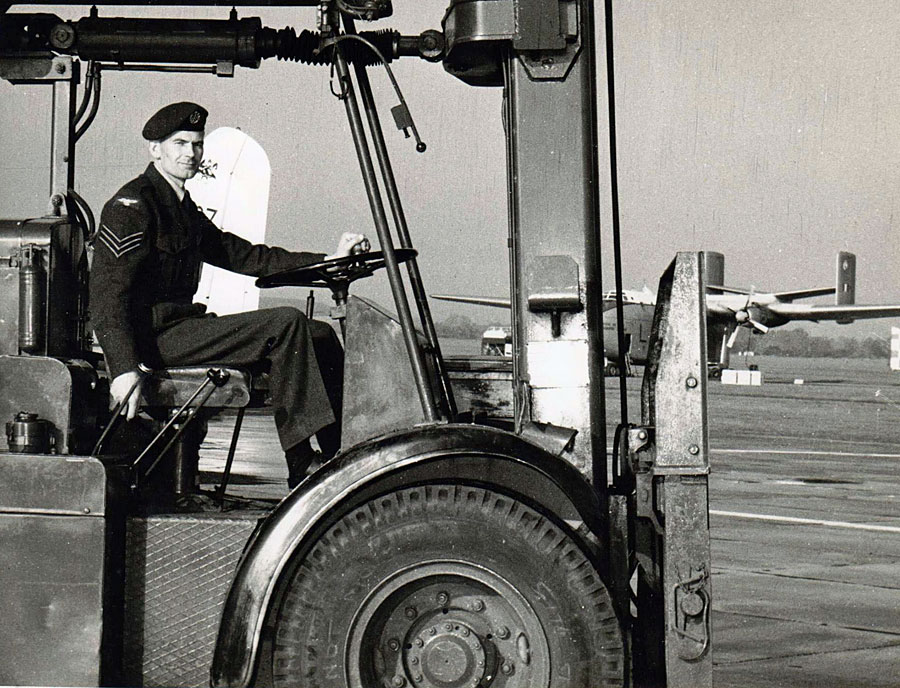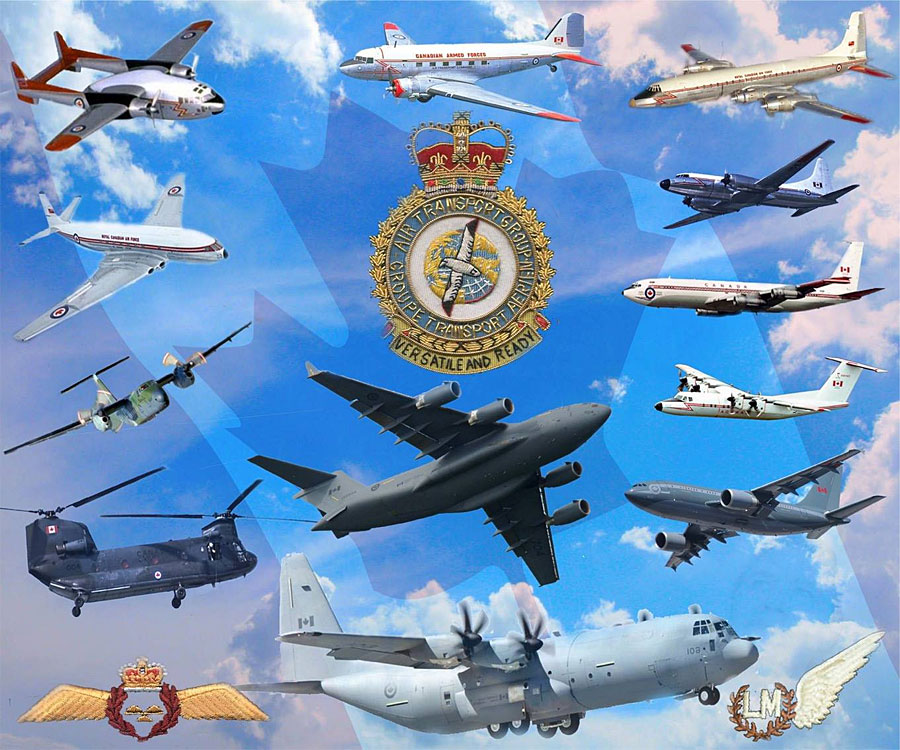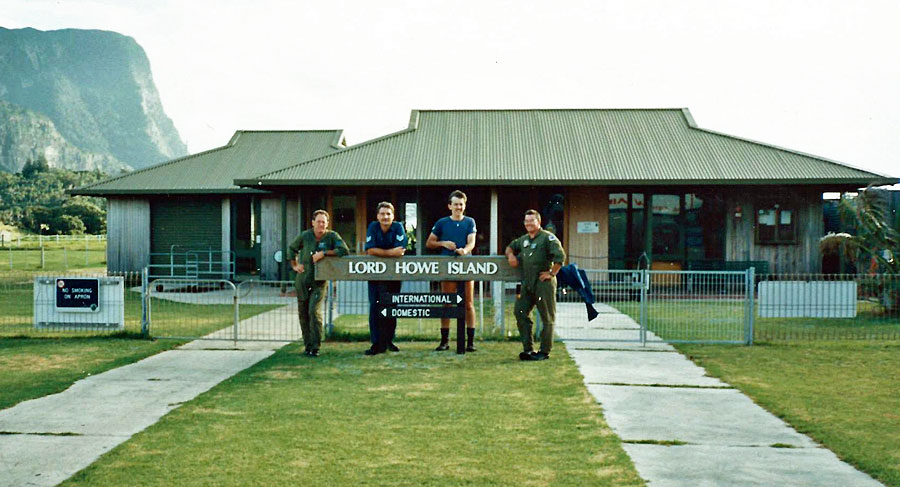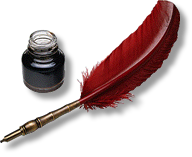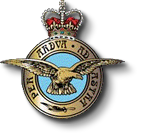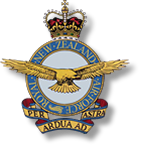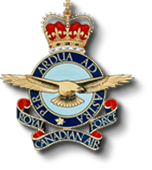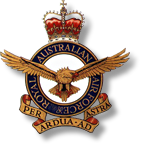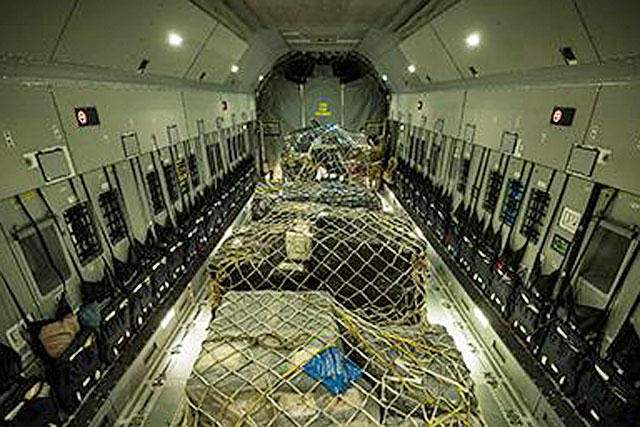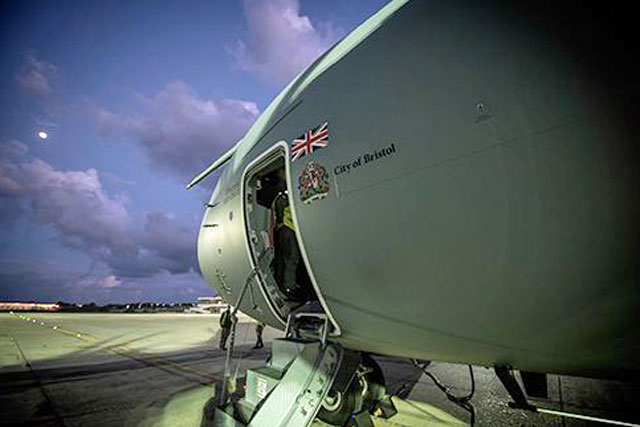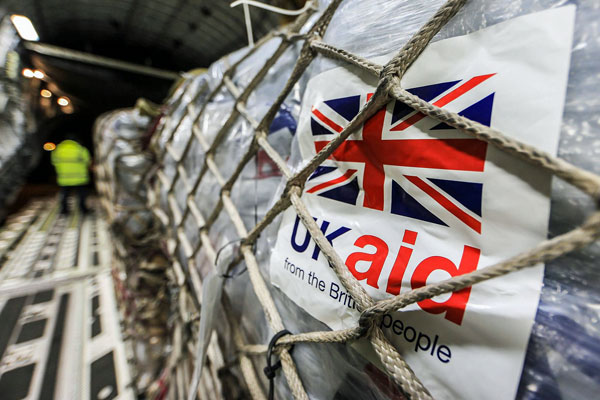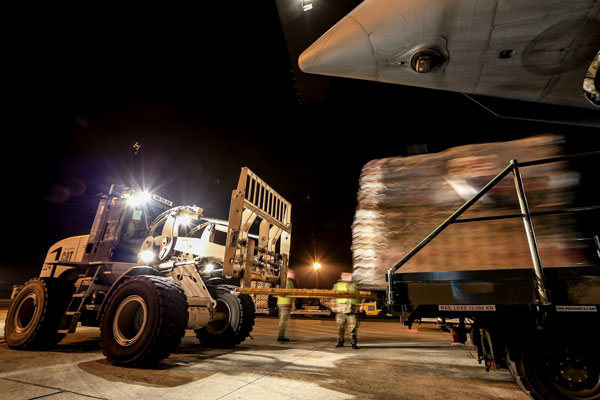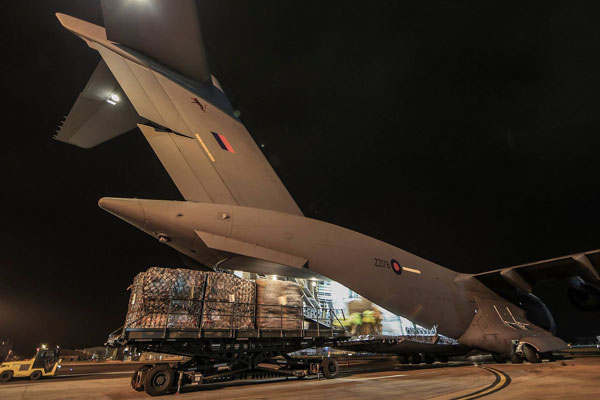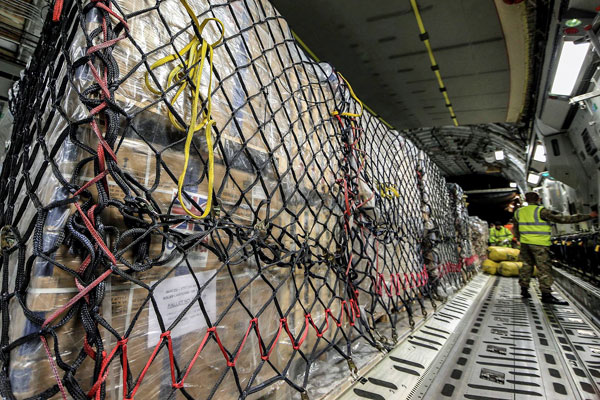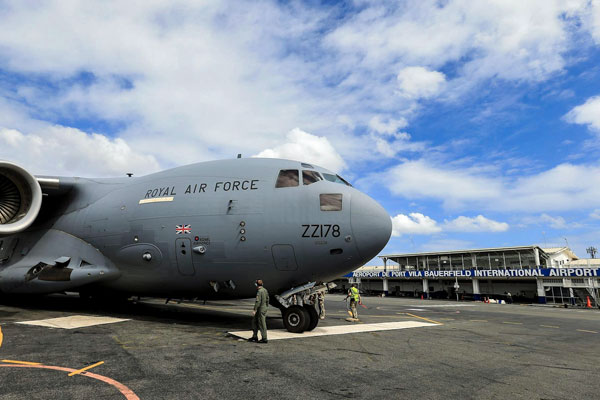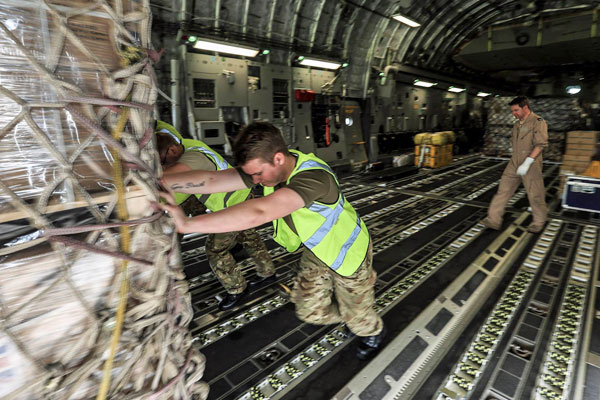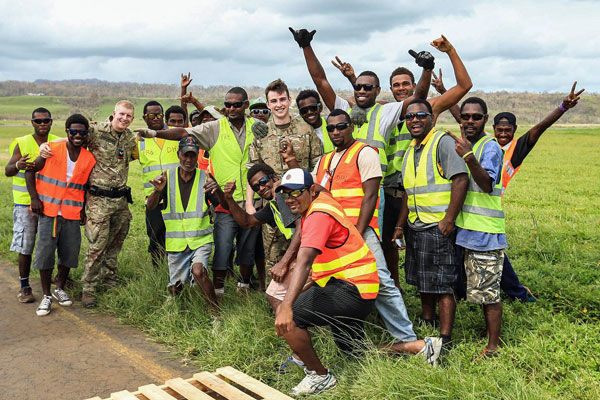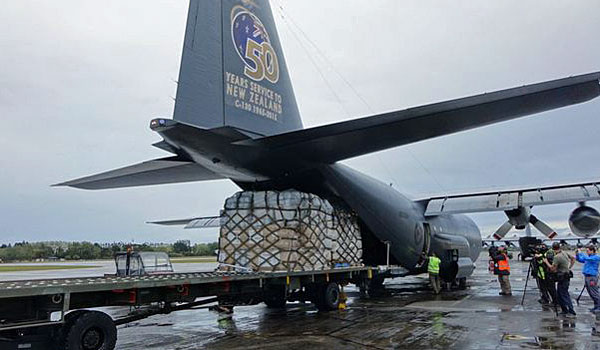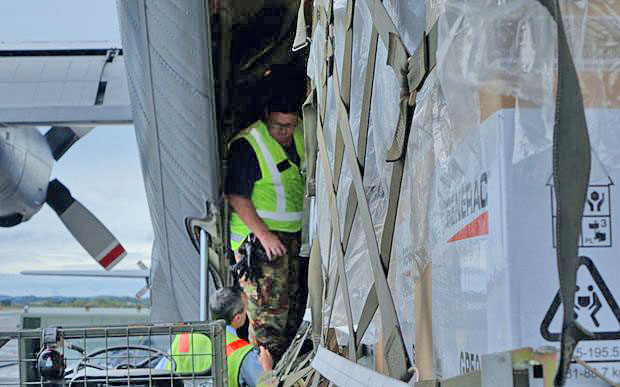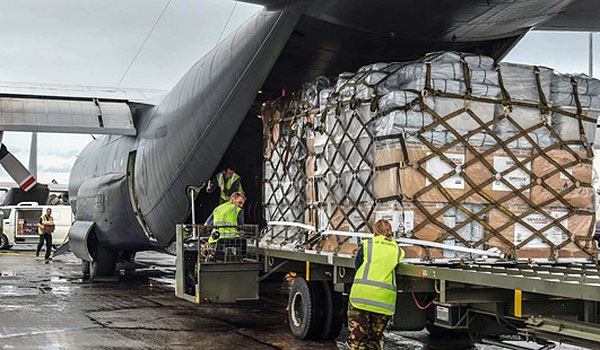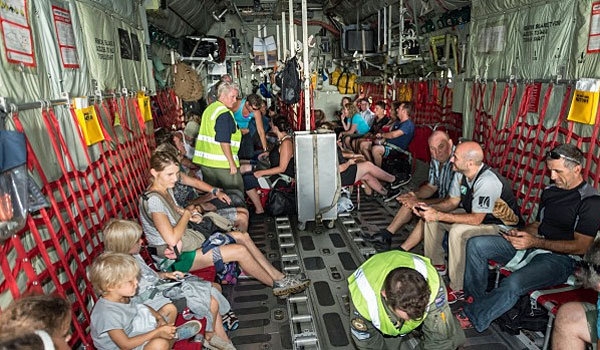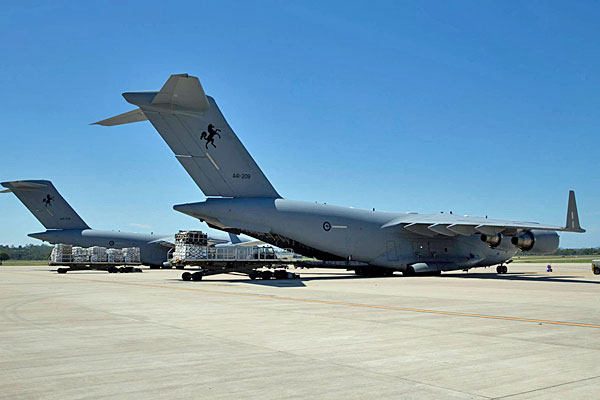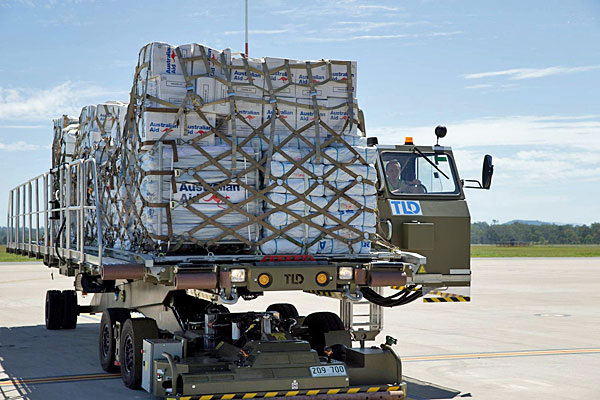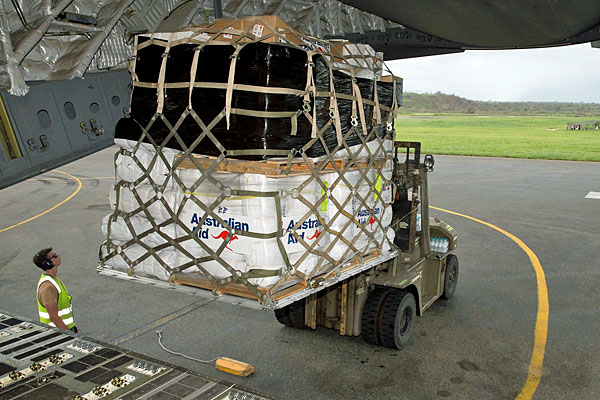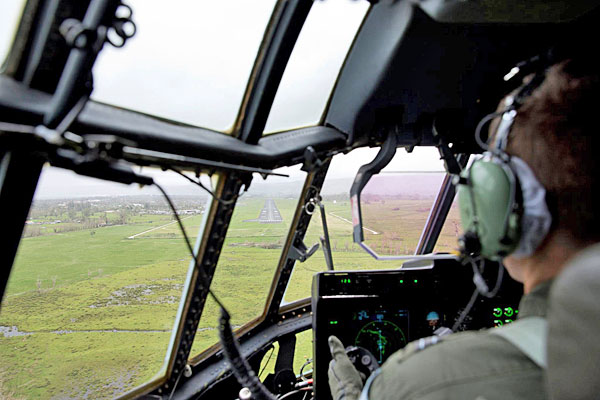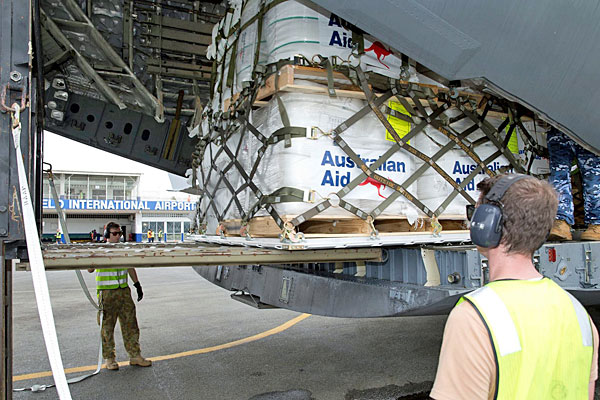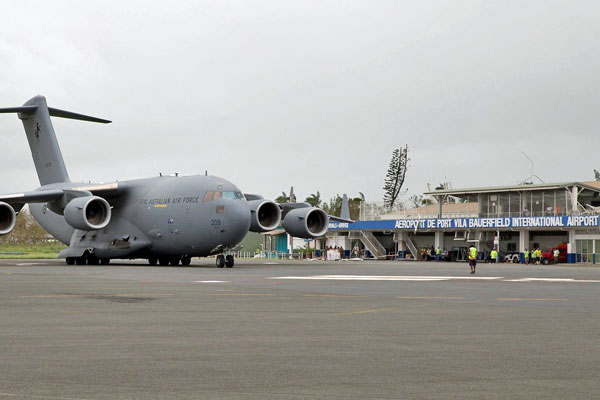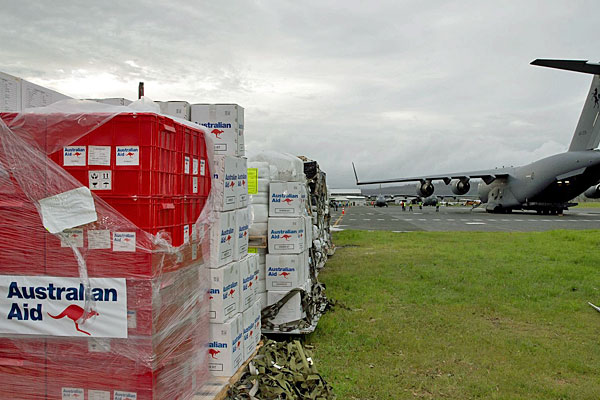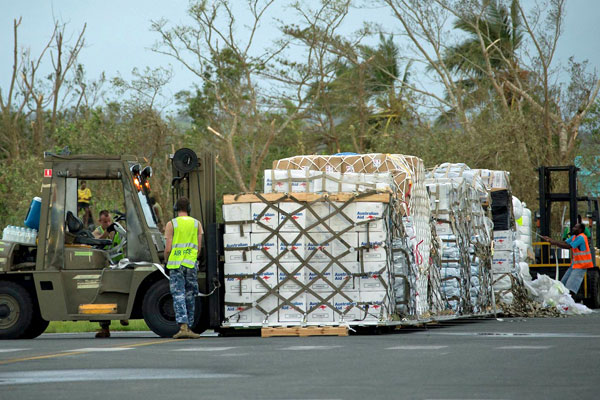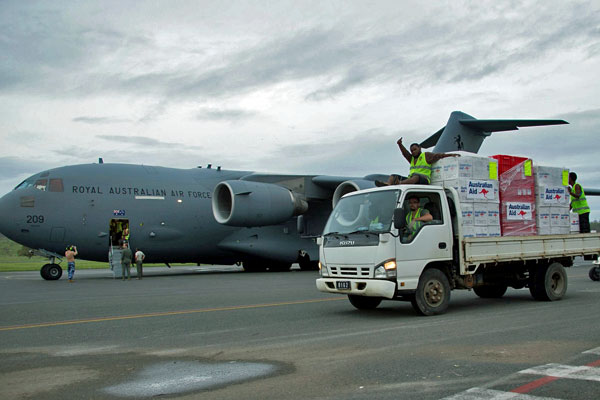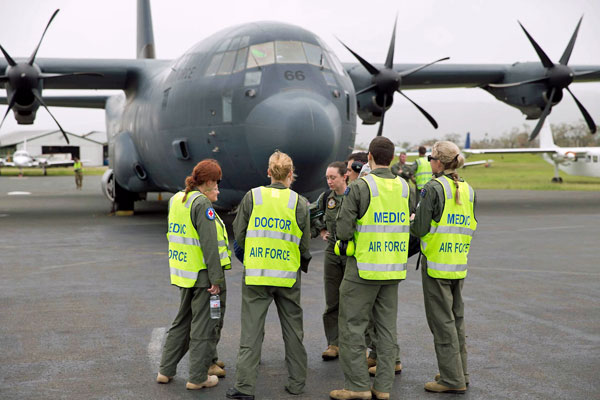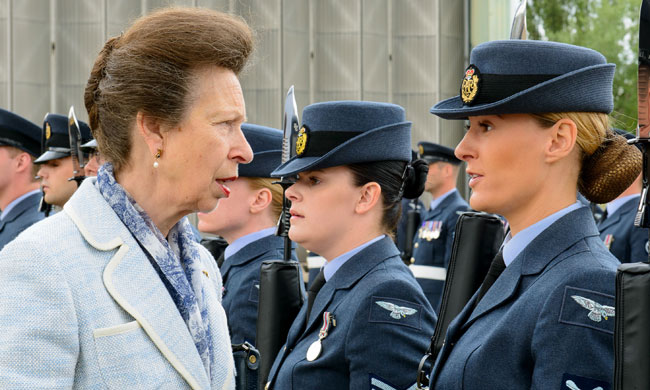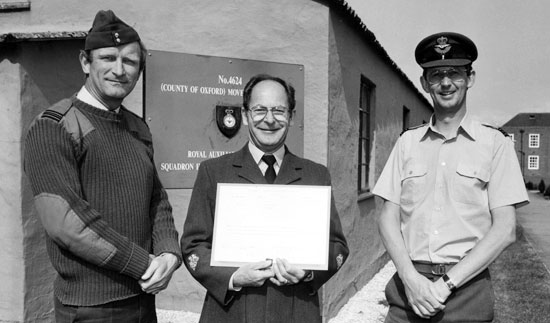
From: Andrew Downard, Ballarat VIC
Sent: Friday, February 27, 2015 12:35 AM
Subject: Free Beer!
Hi Tony,
A couple of stories in the latest newsletter triggered some thoughts on two connected subjects... Strange Situations and Free Beer!
The first was my first ‘Movers’ posting to Muharraq. A Britannia taking Gurkha’s back to Nepal went u/s (who’da thought!) and they were stuck in the lounge with the bar closing after an hour or so. The Gurkha CO approached our DAMO and told him that as it was the very important Gurkhali holiday/celebration Rumypumpypisso, would it be possible to open the bar again? This was done and the passengers got stuck in.
It so happened that the flight was accompanied by a well-known mover to some of the ‘pan team’ and we kind of drifted into the bar. I would love to say this was after we went off duty but I would be bending the truth by a couple of hours. The Gurkhas saw us as being the source of their good fortune and plied us with free beer for many hours. At one stage I found myself next to their CO and asked him what was this holiday/celebration Rumypumpypisso? “No idea” he said “just made it up on the spot!” So if it is a dark and rainy evening and you need an excuse for a few beers just celebrate Rumypumpypisso!
Sent: Friday, February 27, 2015 12:35 AM
Subject: Free Beer!
Hi Tony,
A couple of stories in the latest newsletter triggered some thoughts on two connected subjects... Strange Situations and Free Beer!
The first was my first ‘Movers’ posting to Muharraq. A Britannia taking Gurkha’s back to Nepal went u/s (who’da thought!) and they were stuck in the lounge with the bar closing after an hour or so. The Gurkha CO approached our DAMO and told him that as it was the very important Gurkhali holiday/celebration Rumypumpypisso, would it be possible to open the bar again? This was done and the passengers got stuck in.
It so happened that the flight was accompanied by a well-known mover to some of the ‘pan team’ and we kind of drifted into the bar. I would love to say this was after we went off duty but I would be bending the truth by a couple of hours. The Gurkhas saw us as being the source of their good fortune and plied us with free beer for many hours. At one stage I found myself next to their CO and asked him what was this holiday/celebration Rumypumpypisso? “No idea” he said “just made it up on the spot!” So if it is a dark and rainy evening and you need an excuse for a few beers just celebrate Rumypumpypisso!
The second involved scary Colonels and implements of destruction (not duelling pistols luckily). We were moving the Royal Irish Rangers back to the UK after their tour in Cyprus and on the day the RIR boss turned up with his badge of office a large and long blackthorn stick. My nuggetty Flight Sergeant took one look at this and told me to go and confiscate the stick, put a tag on it and put it in the hold.
This did not go down well at all and there was a lot of “do you know who I am? Who is your Commanding Officer?” conversations in loud voices. In the end we got the ‘big stick’ and duly put it in the hold. About six months later I turned up in Exeter for a resettlement course and found that three of the group were Irish, they took one look at me and said that I was the famous guy who’d confiscated the blackthorn stick and proceeded to buy me beers for the whole week. I’m not sure of what the Col was in the habit of doing with the stick (or why it was black!) but the troops in Exeter certainly felt it was worth a whole lot of beer!
This did not go down well at all and there was a lot of “do you know who I am? Who is your Commanding Officer?” conversations in loud voices. In the end we got the ‘big stick’ and duly put it in the hold. About six months later I turned up in Exeter for a resettlement course and found that three of the group were Irish, they took one look at me and said that I was the famous guy who’d confiscated the blackthorn stick and proceeded to buy me beers for the whole week. I’m not sure of what the Col was in the habit of doing with the stick (or why it was black!) but the troops in Exeter certainly felt it was worth a whole lot of beer!
The third story was from Gan in the Maldive Islands. Every few months a cargo ship would turn up to re-supply the base and this was pre-containerisation. Lots of serious humping and dumping with a local Maldivian work crew. Unloading occurred out in the lagoon with the offloaded materiel being ferried to shore on landing craft. After a long hot day we found the crew at the stern of the boat having a drink (all good Movers need operating ‘Beer Radar’). The Captain had a rule that if anyone spilled beer on his deck they had to buy a case. We turned up just as one of the crew sinned so we joined in. Seemed a simple process, open can, place to lips, drink and don’t spill it. The crew had been going a while so they provided plenty of cases to keep things going. One of our smarter gang members noticed that if supplies were running low slopping some beer on the deck would trigger a bellow from the Captain for another case of beer. We didn’t make it to shore that night, climbing down a rope ladder was definitely not a good idea. We didn’t have to pay for our spills, deliberate or accidental, although I am assuming someone in Whitehall didn’t get a bill at some stage!
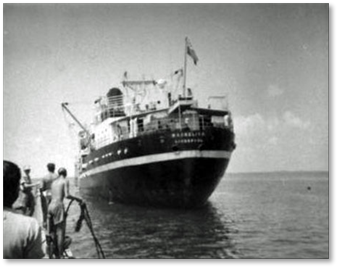
I’m sure others will have their own “Free Beer” stories and hopefully ones that didn’t occur on duty!
Andy
Andy
Atlas Delivers First Operational Payload
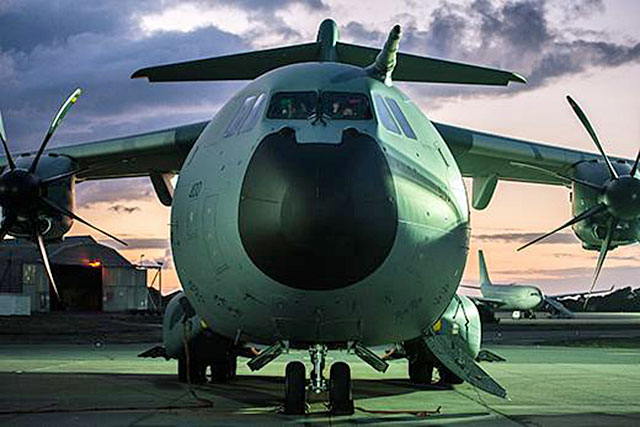
The A400M Atlas, the Royal Air Force’s newest airlift aircraft, delivered a cargo of vital freight into Cyprus this week on its first operational mission as it prepares for initial operational capability later this year.
The aircraft, ‘City of Bristol’, flew into RAF Akrotiri delivering operational freight, making this training flight also Atlas’ first operational tasking. In the Captain’s seat on this historic flight was 24 Squadron pilot, Flight Lieutenant Jamie “JJ” Jackson. He said:
“This flight was incredibly significant for the Royal Air Force demonstrating the capability of the aircraft and that we are able to use it to support operations even before we are declared operational. Once we were airborne the aircraft performed well throughout all phases of flight and was great to fly.”
The aircraft, ‘City of Bristol’, flew into RAF Akrotiri delivering operational freight, making this training flight also Atlas’ first operational tasking. In the Captain’s seat on this historic flight was 24 Squadron pilot, Flight Lieutenant Jamie “JJ” Jackson. He said:
“This flight was incredibly significant for the Royal Air Force demonstrating the capability of the aircraft and that we are able to use it to support operations even before we are declared operational. Once we were airborne the aircraft performed well throughout all phases of flight and was great to fly.”
Destined to replace the C130 Hercules, the Atlas is a significantly larger aircraft that has been designed to project tactical air mobility capabilities at range, direct to the point of need.
Wing Commander Simon Boyle, Officer Commanding 70 Squadron, said: “This task illustrates how we are developing the use of the aircraft in this early period. We have been able to support defence operations whilst continuing to grow the experience of our Force’s aircrew instructors, before they begin to train the crews destined for 70 Squadron later this year.”
Wing Commander Simon Boyle, Officer Commanding 70 Squadron, said: “This task illustrates how we are developing the use of the aircraft in this early period. We have been able to support defence operations whilst continuing to grow the experience of our Force’s aircrew instructors, before they begin to train the crews destined for 70 Squadron later this year.”
The aircraft’s load consisted of a variety of freight. Speaking at the Atlas’ UK base at RAF Brize Norton, Simon added: “The delivery of operational freight is central to the mission of the Atlas Force. This is an important step towards the declaration of an initial strategic Air Transport capability on Atlas in RAF service, and bodes well for 70 Squadron becoming operational as the front-line Atlas squadron later this year.”
Also taking part in the aircraft’s first operational flight was 70 Squadron’s Senior Loadmaster, Master Aircrewman Ian Price. He said: “Given Akrotiri’s pivotal role as a staging post for the RAF, this trip has provided a fantastic opportunity for us to work alongside the Movements team here as we continue to develop our understanding of the impressive payload capabilities of our new aircraft.”
RAF
Also taking part in the aircraft’s first operational flight was 70 Squadron’s Senior Loadmaster, Master Aircrewman Ian Price. He said: “Given Akrotiri’s pivotal role as a staging post for the RAF, this trip has provided a fantastic opportunity for us to work alongside the Movements team here as we continue to develop our understanding of the impressive payload capabilities of our new aircraft.”
RAF
From: Victor Smith, Brassall, QLD
Sent: Thursday, February 26, 2015 9:53 PM
Subject: Response to Dave Stevens
Tony,
Thanks again for a good read.
Further to David Stevens’ story about his shenanigans at Ubon, Thailand. The RAAF operated 8 Sabre fighters of 79Sqn from Ubon between ‘64 to August ‘68. They were operating there as part of the then SEATO (South East Asian Treaty Organisation) and were tasked with providing Air Defence for the Base.
As the conflict in Vietnam escalated, our USAF mates increased the numbers of aircraft, including Phantoms, which were operating from the Base. By the time I got there in March ‘67, the USAF were operating strikes over Vietnam 24 hours a day. As you can imagine, the base was somewhat noisy. From memory, my living quarters were approximately 400 yards from the end of the runway so the thump of afterburners kicking in was very evident.
As an Airfield Defence Guard (ADG) at the time, I worked a rotating type of shift which included main gate and back gate guards, roving picquets, radio watch, convoy escorts if required and off base patrols up to 5km or so off base. As you would understand, we quickly learned to sleep whenever we got the chance.
I had my 19th Birthday at Ubon Ratchatani and a month later was stepping out of a C130 onto the Tarmac at Vung Tau for my first stint in Vietnam. The aircraft operating from Vung Tau were all prop jobs, C130s, Caribous etc., plus choppers, so the area was significantly quieter than Ubon. So for my first couple of weeks there I had difficulty sleeping because it was so quiet.
Thanks again for your work and my warmest regards to all Movements colleagues who read your site.
Vic
Sent: Thursday, February 26, 2015 9:53 PM
Subject: Response to Dave Stevens
Tony,
Thanks again for a good read.
Further to David Stevens’ story about his shenanigans at Ubon, Thailand. The RAAF operated 8 Sabre fighters of 79Sqn from Ubon between ‘64 to August ‘68. They were operating there as part of the then SEATO (South East Asian Treaty Organisation) and were tasked with providing Air Defence for the Base.
As the conflict in Vietnam escalated, our USAF mates increased the numbers of aircraft, including Phantoms, which were operating from the Base. By the time I got there in March ‘67, the USAF were operating strikes over Vietnam 24 hours a day. As you can imagine, the base was somewhat noisy. From memory, my living quarters were approximately 400 yards from the end of the runway so the thump of afterburners kicking in was very evident.
As an Airfield Defence Guard (ADG) at the time, I worked a rotating type of shift which included main gate and back gate guards, roving picquets, radio watch, convoy escorts if required and off base patrols up to 5km or so off base. As you would understand, we quickly learned to sleep whenever we got the chance.
I had my 19th Birthday at Ubon Ratchatani and a month later was stepping out of a C130 onto the Tarmac at Vung Tau for my first stint in Vietnam. The aircraft operating from Vung Tau were all prop jobs, C130s, Caribous etc., plus choppers, so the area was significantly quieter than Ubon. So for my first couple of weeks there I had difficulty sleeping because it was so quiet.
Thanks again for your work and my warmest regards to all Movements colleagues who read your site.
Vic
Oman assists Britain in evacuating its diplomats from Yemen
MUSCAT - March 22, 2015 - The Ministry of Foreign Affairs (MoFA) said on Saturday that it is assisting the British government in the evacuation of its diplomats from Aden in Yemen.
A statement released by MoFA reads as follows: “In response to the Royal Orders of His Majesty Sultan Qaboos bin Said, the sultanate in coordination with the Yemeni authorities has secured and facilitated the transfer of British diplomats to the country using an aircraft of the Royal Air Force of Oman, in preparation for return to their country.”
Another statement released by MoFA on Saturday added that following the Royal Orders of His Majesty the Sultan, 40 Yemenis, including a number of children were evacuated to Oman on Saturday morning to receive medical treatment. Most of them were injured in the blasts that killed 142 people on Friday.
muscatdaily.com
A statement released by MoFA reads as follows: “In response to the Royal Orders of His Majesty Sultan Qaboos bin Said, the sultanate in coordination with the Yemeni authorities has secured and facilitated the transfer of British diplomats to the country using an aircraft of the Royal Air Force of Oman, in preparation for return to their country.”
Another statement released by MoFA on Saturday added that following the Royal Orders of His Majesty the Sultan, 40 Yemenis, including a number of children were evacuated to Oman on Saturday morning to receive medical treatment. Most of them were injured in the blasts that killed 142 people on Friday.
muscatdaily.com
UK aid arrives in cyclone hit Vanuatu
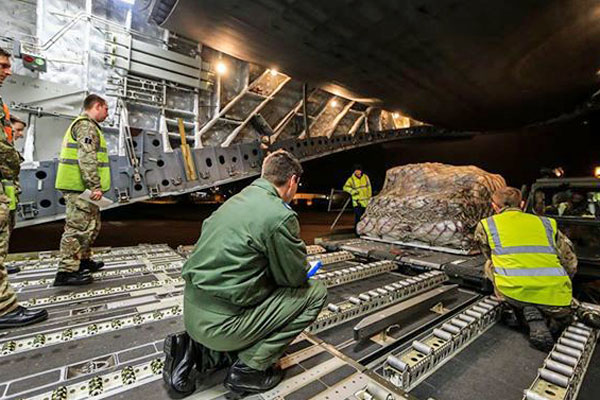
Aid from the UK was delivered to cyclone-struck Vanuatu after winds of up to 155 mph and heavy rainfall caused widespread destruction.
An RAF plane carrying 1,640 shelter kits and more than 1,900 solar lanterns with phone chargers landed at around 3am UK time after the government pledged £2 million towards UN humanitarian aid efforts. The supplies will help protect some of the most vulnerable people affected by the cyclone, especially women and children, the Dept for Int'l Development (DfID) said.
The C-17 transport plane flew out from RAF Brize Norton inbound for the RAAF base at Amberley, Australia, before linking up with international agencies.
An RAF plane carrying 1,640 shelter kits and more than 1,900 solar lanterns with phone chargers landed at around 3am UK time after the government pledged £2 million towards UN humanitarian aid efforts. The supplies will help protect some of the most vulnerable people affected by the cyclone, especially women and children, the Dept for Int'l Development (DfID) said.
The C-17 transport plane flew out from RAF Brize Norton inbound for the RAAF base at Amberley, Australia, before linking up with international agencies.
ITV.com
Two British humanitarian experts are also based in Vanuatu to ensure the emergency supplies reach people affected and to assess what further assistance Britain can provide, the DfID said. Britain's rapid response to humanitarian disasters on the other side of the world is something to be incredibly proud of.
From: Thomas Geoghegan, Folkestone
Sent: Monday, March 02, 2015 4:40 PM
Subject: Re: UKMAMS OBA OBB #022715
Hello Tony,
I don't really have a great deal of empathy with you chaps from the MAMS branch of what was called by our old station commander Muharraq, “The most wonderful club in the world.”
I alas was only involved with MAMS on one exercise at Skrydstrup, Denmark, a long time ago, so perhaps you won't mind me putting my little four-pennyworth in, so to speak.
Referring to one item relating to Strange Situations from John Bell: I’m at a loss as to why he should get involved with the situation regarding the Hercules crew and their supernumerary crew member; the young lady from Seoul. It might be understandable if Mr Bell served as a Snow Drop (RAF Policeman, so described because of the white covering on their service dress hat), but cannot understand otherwise. I bet the crew involved adored him!
I on the other hand, on one occasion, was responsible for seeing a Pembroke aircraft off only to be called into the bosses office to ascertain why there were two unmanifested passengers on board, but that is another story!
Best Regards,
Tod Geoghegan
Sent: Monday, March 02, 2015 4:40 PM
Subject: Re: UKMAMS OBA OBB #022715
Hello Tony,
I don't really have a great deal of empathy with you chaps from the MAMS branch of what was called by our old station commander Muharraq, “The most wonderful club in the world.”
I alas was only involved with MAMS on one exercise at Skrydstrup, Denmark, a long time ago, so perhaps you won't mind me putting my little four-pennyworth in, so to speak.
Referring to one item relating to Strange Situations from John Bell: I’m at a loss as to why he should get involved with the situation regarding the Hercules crew and their supernumerary crew member; the young lady from Seoul. It might be understandable if Mr Bell served as a Snow Drop (RAF Policeman, so described because of the white covering on their service dress hat), but cannot understand otherwise. I bet the crew involved adored him!
I on the other hand, on one occasion, was responsible for seeing a Pembroke aircraft off only to be called into the bosses office to ascertain why there were two unmanifested passengers on board, but that is another story!
Best Regards,
Tod Geoghegan
Don't forget - in the UK the clocks go forward by one hour this weekend - the last Sunday in March
From: Ian Envis, Crowborough
Sent: Friday, March 20, 2015 5:57 AM
Subject: Gus Cobb’s Funeral
Gus was given a true Mover’s farewell with Keith Parker adding an appropriate irreverent and amusing eulogy to help Gus on his way - he even led the arm swaying to go with the Rod Stewart song ''Sailing'' as we collectively sat and reflected on the life and times of Gus.
Elaine and the family were obviously very happy to see so many ''old faces'' in attendance which ensured the funeral was a real celebration. To end the service we all exited to the sounds of John Denver's ''Leaving on a Jet Plane'' and decanted to a fine spread at the Angel Hotel in Royal Wootton Bassett. There were so many of the Celtic races present the wake was a useful reminder of the Scot that Gus always was!
Many of us can relate funny and serious stories about his achievements, including the prevention of the hi-jacking of HMQ's C-130 in Nicaragua back in '79. Gus was a legend in his own lifetime may he rest in peace.
Ian
Sent: Friday, March 20, 2015 5:57 AM
Subject: Gus Cobb’s Funeral
Gus was given a true Mover’s farewell with Keith Parker adding an appropriate irreverent and amusing eulogy to help Gus on his way - he even led the arm swaying to go with the Rod Stewart song ''Sailing'' as we collectively sat and reflected on the life and times of Gus.
Elaine and the family were obviously very happy to see so many ''old faces'' in attendance which ensured the funeral was a real celebration. To end the service we all exited to the sounds of John Denver's ''Leaving on a Jet Plane'' and decanted to a fine spread at the Angel Hotel in Royal Wootton Bassett. There were so many of the Celtic races present the wake was a useful reminder of the Scot that Gus always was!
Many of us can relate funny and serious stories about his achievements, including the prevention of the hi-jacking of HMQ's C-130 in Nicaragua back in '79. Gus was a legend in his own lifetime may he rest in peace.
Ian
A Farewell to Gus Cobb
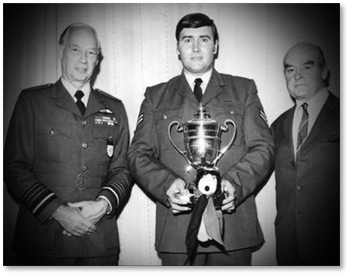
RAF Escaping Society Trophy presented to Cpl A Cobb
for his part in thwarting a hi-jacking by Nicaraguan troops
for his part in thwarting a hi-jacking by Nicaraguan troops
The following is a copy of an e-mail that was sent from Phil Smith to Gus Cobb back in September 2013:
Hi Gus,
I do not know if you remember me from 1975 but I certainly remember you. I seem to recall we only did one UKMAMS trip together.
SAC Gus Cobb and SAC Phil Smith arrived on Belfast Flight Ascot 9064 in Shiraz, Southern Iran, on 9 May 1975 along with a few other UKMAMS reprobates. You and I shared a hotel room for three nights. The stay was memorable for two main reasons.
1. We experienced an earthquake that rearranged the furniture in the room during the first evening we were there. I remember the bedside light ending up on the floor just after the quake hit and you and I just looking at each other thinking what the f.....g hell are we doing on the 12th floor of a hotel that is shaking and swaying!
2. You and I had acquired from the Loadmaster on the Belfast a huge poly bag full of white bread rolls and tins and tins of tomato soup. In true UKMAMS tradition of not buying food "on the ground" and instead buying as much alcohol as possible, we ate nothing but tomato soup with bread rolls for 72 hours. The soup was heated by some electrical device you had with you, some element type of appliance which worked very well indeed. When we fancied a change we had it cold.
The Hotel Reception Staff looked at us more than once when we "checked in" of course, you with the poly bag of rolls over your shoulder and me with the tins of soup in another bag over my shoulder!
Time passes and the RAF came and went. Some good blokes in The Mob and some not so good. I would put you in the former group.
Please drop me a line if you feel the same way about tomato soup.
Phil Smith
I do not know if you remember me from 1975 but I certainly remember you. I seem to recall we only did one UKMAMS trip together.
SAC Gus Cobb and SAC Phil Smith arrived on Belfast Flight Ascot 9064 in Shiraz, Southern Iran, on 9 May 1975 along with a few other UKMAMS reprobates. You and I shared a hotel room for three nights. The stay was memorable for two main reasons.
1. We experienced an earthquake that rearranged the furniture in the room during the first evening we were there. I remember the bedside light ending up on the floor just after the quake hit and you and I just looking at each other thinking what the f.....g hell are we doing on the 12th floor of a hotel that is shaking and swaying!
2. You and I had acquired from the Loadmaster on the Belfast a huge poly bag full of white bread rolls and tins and tins of tomato soup. In true UKMAMS tradition of not buying food "on the ground" and instead buying as much alcohol as possible, we ate nothing but tomato soup with bread rolls for 72 hours. The soup was heated by some electrical device you had with you, some element type of appliance which worked very well indeed. When we fancied a change we had it cold.
The Hotel Reception Staff looked at us more than once when we "checked in" of course, you with the poly bag of rolls over your shoulder and me with the tins of soup in another bag over my shoulder!
Time passes and the RAF came and went. Some good blokes in The Mob and some not so good. I would put you in the former group.
Please drop me a line if you feel the same way about tomato soup.
Phil Smith
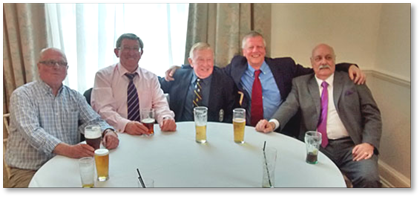
Ode to Gus
Another Mover passed away, his final posting came far too soon
Fellow Movers will be there on the day to offer words that will say
Fare thee well Brother Mover, we'll think of years we spent together
Straining at those loads we spread and chained in far-off places
In wind and rain, sand and snow, and in jungles that made us glow
Our ages now show our trim, our weight and balance is all askew
And we become more of a few - Rest in peace.
Another Mover passed away, his final posting came far too soon
Fellow Movers will be there on the day to offer words that will say
Fare thee well Brother Mover, we'll think of years we spent together
Straining at those loads we spread and chained in far-off places
In wind and rain, sand and snow, and in jungles that made us glow
Our ages now show our trim, our weight and balance is all askew
And we become more of a few - Rest in peace.
Celebrating Gus's life at the Angel are:
Messers Gledhill, Kilpatrick, Heaphy, Holland and Muffett
Messers Gledhill, Kilpatrick, Heaphy, Holland and Muffett
Gerry Davis
From: Keith Parker, Bowerhill, Wilts
Sent: Saturday, March 21, 2015 2:57 PM
Subject: Gus Cobb's Funeral
Hi Tony,
It all went well, as well as can be expected, particularly the arm waving which was a speciality of Gus when having a night out on the pop. It could become a signature tune and effort at many services ahead.
I had a quick word with Elaine before she left and she said a big thank you to all the Movers, especially the OBA for all the help and support.
I'll add my thanks to that, a big cheers to you mate; it couldn't have been so successful without your help
Keith
Sent: Saturday, March 21, 2015 2:57 PM
Subject: Gus Cobb's Funeral
Hi Tony,
It all went well, as well as can be expected, particularly the arm waving which was a speciality of Gus when having a night out on the pop. It could become a signature tune and effort at many services ahead.
I had a quick word with Elaine before she left and she said a big thank you to all the Movers, especially the OBA for all the help and support.
I'll add my thanks to that, a big cheers to you mate; it couldn't have been so successful without your help
Keith
Among those in attendance were:
Dave & Rosemary Abrams
Colin Allen
John Belcher
Ian Berry
Dougie Betambeau
Keith Boosey
Jackie Brice
Mike Brundle
Jim Buchanan
John Calver
Peter & Sue Clayton
John Cockayne
John & Roz Conduit
Owen Connell
Jim & Jo Cunningham
Tony Dunphy
Colin Allen
John Belcher
Ian Berry
Dougie Betambeau
Keith Boosey
Jackie Brice
Mike Brundle
Jim Buchanan
John Calver
Peter & Sue Clayton
John Cockayne
John & Roz Conduit
Owen Connell
Jim & Jo Cunningham
Tony Dunphy
Denise (Tommy) Eccles
Ian Envis
Martin & Dee Gledhill
Mick Goater
Don & Maureen Hazlewood
Sam Heaphy
Bob Hodder
Dave (Dutch) Holland
Dave Howell
Al & Lorraine Irving
Paul Jarvis
Taff Jones
Chris & Mrs Keane
Al & Carol Kilpatrick
Bob Maskell
Mick & Mrs Maybery
Ian Envis
Martin & Dee Gledhill
Mick Goater
Don & Maureen Hazlewood
Sam Heaphy
Bob Hodder
Dave (Dutch) Holland
Dave Howell
Al & Lorraine Irving
Paul Jarvis
Taff Jones
Chris & Mrs Keane
Al & Carol Kilpatrick
Bob Maskell
Mick & Mrs Maybery
John & Jean McClymont
Don & Mrs Milburn
Pete Morrison
Gerry & Joan Muffett
Keith & Daphne Parker
Steve Perry
Paddy Power
Al & Maggie Randle
Dave Roach
Geordie Rochester
Ian Russell
Mark Taylor
Gus Turney
Wally Walters
Paul & Diane Weir
Keith Wilson
Don & Mrs Milburn
Pete Morrison
Gerry & Joan Muffett
Keith & Daphne Parker
Steve Perry
Paddy Power
Al & Maggie Randle
Dave Roach
Geordie Rochester
Ian Russell
Mark Taylor
Gus Turney
Wally Walters
Paul & Diane Weir
Keith Wilson
From: Ronald Meredith, Spalding, Lincs
Sent: Tuesday, March 03, 2015 7:42 AM
Subject: Bagram 747 crash was more than just a shifted load
I have just received the following which might be of interest.
This air crash did not have the same public media attention as many, but a salutary lesson for what must have been untrained or poorly supervised cargo loaders and failure by flight crew to adequately check whatever restraints, if any applied.
http://fearoflanding.com/accidents/ntsb-open-docket-of-bagram-cargo-crash-documents/
Ron
Sent: Tuesday, March 03, 2015 7:42 AM
Subject: Bagram 747 crash was more than just a shifted load
I have just received the following which might be of interest.
This air crash did not have the same public media attention as many, but a salutary lesson for what must have been untrained or poorly supervised cargo loaders and failure by flight crew to adequately check whatever restraints, if any applied.
http://fearoflanding.com/accidents/ntsb-open-docket-of-bagram-cargo-crash-documents/
Ron
RNZAF Carries Aid to Vanuatu
A Royal New Zealand Air Force (RNZAF) C-130 Hercules from 40 Squadron at RNZAF Base Auckland has arrived in Vanuatu with a first consignment of aid for the stricken country in the wake of Tropical Cyclone Pam.
The consignment included first aids kits, tarpaulins for emergency shelter, water containers, chainsaw packs and generators. Specialist personnel from New Zealand Government agencies and the New Zealand Red Cross were also aboard the Hercules, to assist in providing advice to the High Commission and to help carry out a needs assessment which will shape further assistance.
Head of Air Force operations Air Commodore Kevin McEvoy said that the Air Force is well trained and equipped for such missions.
The consignment included first aids kits, tarpaulins for emergency shelter, water containers, chainsaw packs and generators. Specialist personnel from New Zealand Government agencies and the New Zealand Red Cross were also aboard the Hercules, to assist in providing advice to the High Commission and to help carry out a needs assessment which will shape further assistance.
Head of Air Force operations Air Commodore Kevin McEvoy said that the Air Force is well trained and equipped for such missions.
“Pacific nations such as Vanuatu are our friends and neighbours and we’re happy we can help at times of need. The C-130 Hercules is an ideal platform for operating into areas that may not be accessible to commercial aircraft. With the main airport being closed to civilian transport, a Hercules load makes a real difference in situations like this.
"The work we do with other agencies in exercises and training pays off at times like these, getting equipment and personnel to where they are most needed as quickly as possible, and the whole-of-government planning has gone well,” he said.
“Aerial reconnaissance is another unique capability we provide at times like this and an RNZAF P-3K2 Orion has returned home today after providing reconnaissance support at the request of the Tuvaluan Government to assist with their disaster needs assessment. The aircraft was already in the Pacific Islands after successfully locating a vessel in distress and assisting with its rescue off Tonga on Friday.”
"The work we do with other agencies in exercises and training pays off at times like these, getting equipment and personnel to where they are most needed as quickly as possible, and the whole-of-government planning has gone well,” he said.
“Aerial reconnaissance is another unique capability we provide at times like this and an RNZAF P-3K2 Orion has returned home today after providing reconnaissance support at the request of the Tuvaluan Government to assist with their disaster needs assessment. The aircraft was already in the Pacific Islands after successfully locating a vessel in distress and assisting with its rescue off Tonga on Friday.”
airforce.mil.nz
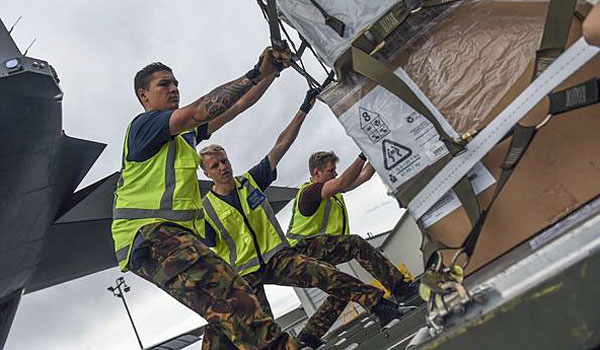
From: Fred Hebb, Gold River, NS
Sent: Monday, March 16, 2015 8:10 AM
Subject: Freebies
Hi Tony, here is a little freebie story I found rather amusing.
I remember a trip to the Azores on a C130 a few years back where there was a bit of a language barrier, well maybe more than a bit. I was attempting to order meals for the flight and could not get through to this guy and his co-workers at all after numerous attempts. I finally got the order made after drawing pictures of everything from cows for beef steak, fruit and a cake for desert.
When the food finally came to the aircraft I received everything I had drawn, even stainless cutlery with an Air Canada logo. When I got the bill it was mistakenly billed to Air Canada. After many attempts of trying to convince the guy we were the Canadian Forces and not Air Canada I gave up and signed the bill for Air Canada.
Thank you Air Canada we enjoyed your surf and turf, Black Forest cake, beautiful fresh fruit and the stainless cutlery worked just fine. The aluminum container also came in handy for many years!
Fred Hebb
Sent: Monday, March 16, 2015 8:10 AM
Subject: Freebies
Hi Tony, here is a little freebie story I found rather amusing.
I remember a trip to the Azores on a C130 a few years back where there was a bit of a language barrier, well maybe more than a bit. I was attempting to order meals for the flight and could not get through to this guy and his co-workers at all after numerous attempts. I finally got the order made after drawing pictures of everything from cows for beef steak, fruit and a cake for desert.
When the food finally came to the aircraft I received everything I had drawn, even stainless cutlery with an Air Canada logo. When I got the bill it was mistakenly billed to Air Canada. After many attempts of trying to convince the guy we were the Canadian Forces and not Air Canada I gave up and signed the bill for Air Canada.
Thank you Air Canada we enjoyed your surf and turf, Black Forest cake, beautiful fresh fruit and the stainless cutlery worked just fine. The aluminum container also came in handy for many years!
Fred Hebb
From: Bryan Morgan, Abingdon
Sent: Monday, March 16, 2015 11:14 AM
Subject: Re: The Next Newsletter - Freebies
Tony,
If you include Duty Free under the heading of "Freebies" I laid down the law, when I was OC UKMAMS, that any abuse of the system would bring down a heavy penalty and I am glad to say that, to my knowledge, everyone obeyed the rules.
Sent: Monday, March 16, 2015 11:14 AM
Subject: Re: The Next Newsletter - Freebies
Tony,
If you include Duty Free under the heading of "Freebies" I laid down the law, when I was OC UKMAMS, that any abuse of the system would bring down a heavy penalty and I am glad to say that, to my knowledge, everyone obeyed the rules.
However, abiding by the rules I had set, I was returning from a task by civil air through Heathrow with one bottle and a permissible number of King Edward cigars for the Station Commander (creep you might say) I was preceded through customs by a very tall blonde with legs up to her proverbials. This caused some distraction to the customs officers on duty whose gaze followed through the green channel. They did not stop her and when I reached them I said light heartedly "Come along gentlemen concentrate on the job in hand".
No sooner were the words out of my mouth when I realised the enormity of my error. My next ten paces seemed to take a life time waiting for the hand on the shoulder!! Fortunately, it never came and I can only assume that customs officers do, after all, have an underlying sense of humour. Never again did I resort to flippancy.
Regards,
Bryan
No sooner were the words out of my mouth when I realised the enormity of my error. My next ten paces seemed to take a life time waiting for the hand on the shoulder!! Fortunately, it never came and I can only assume that customs officers do, after all, have an underlying sense of humour. Never again did I resort to flippancy.
Regards,
Bryan
Australians rush aid to Vanuatu
The Australian Defence Force (ADF) is supporting Australian Government assistance to the people of Vanuatu following the devastation of Tropical Cyclone Pam.
On 15 March 2015, two Royal Australian Air Force C-17A Globemaster and a C130-J Hercules aircraft flew emergency relief stores and personnel from the ADF and Department of Foreign Affairs and Trade from RAAF Base Amberley to Port Villa, Vanuatu.
The ADF personnel will provide military planning advice to Australian Government personnel coordinating the response. Together with New Zealand and France, Australia will continue to assess the humanitarian impact to best support the response effort.
On 15 March 2015, two Royal Australian Air Force C-17A Globemaster and a C130-J Hercules aircraft flew emergency relief stores and personnel from the ADF and Department of Foreign Affairs and Trade from RAAF Base Amberley to Port Villa, Vanuatu.
The ADF personnel will provide military planning advice to Australian Government personnel coordinating the response. Together with New Zealand and France, Australia will continue to assess the humanitarian impact to best support the response effort.
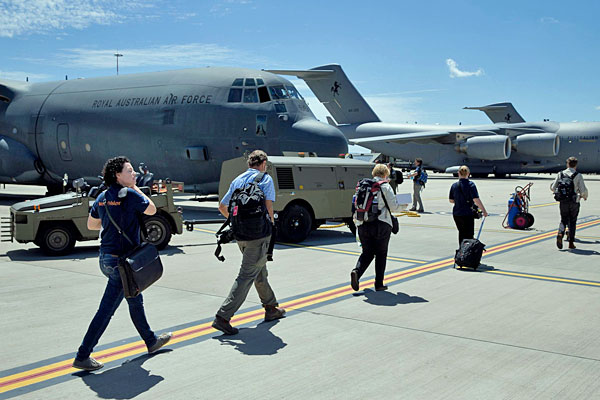
From: John Bell, Desborough, Northants
Sent: Monday, March 16, 2015 10:12 AM
Subject: Freebies
Tony,
In 1964 I was based in Mombasa on an 18 month tour, as the Cpl in a 3 man movements section, parented by RAF Eastleigh (Nairobi). The job covered sea and air movements The air side was mainly Beverley's from RAF Eastleigh from which we unloaded cargo destined to go back to the UK by ship and backloaded inbound sea cargo for the Army, RAF and High Commission in Nairobi.
Our manpower was a matter of going down to the docks and picking 4 or 5 labourers from the hundreds that sat outside the gate waiting for casual work. It was always wise to ensure that you selected English speakers.
One day a Bev was scheduled to deliver a consignment of personal effects and collect a new car for the High Commission. We normally only needed one mover for these tasks so I collected a labour gang from the docks and we drove up to the airport and met the Bev in. The crew shot off to the Army leave centre at Silversands (Nyali Beach) while I unloaded and reloaded the Bev. Before he left the Q (That's the Loadmaster in today's language) gave me a dozen spare crew salad meals to share with the labourers, who had never worked on an aircraft before.
Sent: Monday, March 16, 2015 10:12 AM
Subject: Freebies
Tony,
In 1964 I was based in Mombasa on an 18 month tour, as the Cpl in a 3 man movements section, parented by RAF Eastleigh (Nairobi). The job covered sea and air movements The air side was mainly Beverley's from RAF Eastleigh from which we unloaded cargo destined to go back to the UK by ship and backloaded inbound sea cargo for the Army, RAF and High Commission in Nairobi.
Our manpower was a matter of going down to the docks and picking 4 or 5 labourers from the hundreds that sat outside the gate waiting for casual work. It was always wise to ensure that you selected English speakers.
One day a Bev was scheduled to deliver a consignment of personal effects and collect a new car for the High Commission. We normally only needed one mover for these tasks so I collected a labour gang from the docks and we drove up to the airport and met the Bev in. The crew shot off to the Army leave centre at Silversands (Nyali Beach) while I unloaded and reloaded the Bev. Before he left the Q (That's the Loadmaster in today's language) gave me a dozen spare crew salad meals to share with the labourers, who had never worked on an aircraft before.
We did the job OK, including using the brightest labourer to watch me drive the car onto the aircraft, probably breaking every health and safety (which did not exist then) rule in the book. Loaded a few inbound personal effects and tied them in. After completing the trim sheet I took the labourers to the side of the pan and shared out the freebie meals, which they devoured with great gusto. Two and a bit salads each.
It should be explained that the labourers were Africans. Mombasa was a port used for centuries by Arab traders and over time most locals had become members of the Moslem faith.
After the crew returned and took off, the labourers piled into the minibus and I paid them the going rate and drove off for the docks. On the way one guy asked me what was the meat that had been in the salad. At this time the staple diet for these guys was mainly maize. I was about to tell him that the meal was a ham salad when I realised what I had done. I had inadvertently fed 5 Moslems ham, lots of ham. I explained to them that it was Turkey meat.
Oops!
It should be explained that the labourers were Africans. Mombasa was a port used for centuries by Arab traders and over time most locals had become members of the Moslem faith.
After the crew returned and took off, the labourers piled into the minibus and I paid them the going rate and drove off for the docks. On the way one guy asked me what was the meat that had been in the salad. At this time the staple diet for these guys was mainly maize. I was about to tell him that the meal was a ham salad when I realised what I had done. I had inadvertently fed 5 Moslems ham, lots of ham. I explained to them that it was Turkey meat.
Oops!
Tally Ho!
10 Interesting Facts and Figures about Britain’s
Royal Air Force You Might Not Have Known
10 Interesting Facts and Figures about Britain’s
Royal Air Force You Might Not Have Known
The Royal Air Force has existed since 1918 and helps to keep Britain safe in the air as well aiding the efforts of ground forces. At the time it was formed, it was the largest air force in the world. It expanded even more during World War II and today is still one of the world’s leading air powers. If you wanted to know more about the RAF, you’ve come to the right place. Here are ten interesting facts that you may not have known.
Who You Calling Junior?
The RAF is known as a “junior” service because it is the last one to have formed. The Royal Marines formed in 1664. The British Army was formed as a standing army in 1660. The Royal Navy was formed under the reign of Henry VIII and, being the oldest of the military branches, is known as the “senior” service.
The RAF is known as a “junior” service because it is the last one to have formed. The Royal Marines formed in 1664. The British Army was formed as a standing army in 1660. The Royal Navy was formed under the reign of Henry VIII and, being the oldest of the military branches, is known as the “senior” service.
Losses
During World War II, the RAF had the largest casualty rate, in part due to Britain’s bombing campaign against Germany. With 55,000 air crewman dying on these bombing missions, the RAF’s loss rate was the highest of any of the British armed forces during the war.
During World War II, the RAF had the largest casualty rate, in part due to Britain’s bombing campaign against Germany. With 55,000 air crewman dying on these bombing missions, the RAF’s loss rate was the highest of any of the British armed forces during the war.
The Jet
The Gloster Meteor was the first jet fighter used by the RAF. It first flew in March 1943 and was introduced into the war in July 1944, though it saw limited action. Much like its German counterpart, the Messerschmitt ME-262, its introduction came a little late to have a significant effect on the war as the tide was already turning against the Axis Powers.
The Gloster Meteor was the first jet fighter used by the RAF. It first flew in March 1943 and was introduced into the war in July 1944, though it saw limited action. Much like its German counterpart, the Messerschmitt ME-262, its introduction came a little late to have a significant effect on the war as the tide was already turning against the Axis Powers.
The Numbers
During World War II, the RAF counted some 1,208,000 members, with 185,000 serving as aircrew
During World War II, the RAF counted some 1,208,000 members, with 185,000 serving as aircrew
Spitfire
Perhaps the most famous plane of all time in the RAF’s possession is the Supermarine 300, more famously known as the Supermarine Spitfire. Its first flight was 5 March 1936 and after flying it, the test pilot, “Mutt” Summers, reportedly told the designers “Don’t touch anything.”
Perhaps the most famous plane of all time in the RAF’s possession is the Supermarine 300, more famously known as the Supermarine Spitfire. Its first flight was 5 March 1936 and after flying it, the test pilot, “Mutt” Summers, reportedly told the designers “Don’t touch anything.”
Motto
The motto of the RAF is “Per Ardua Ad Astra”, which is Latin for “By rough roads to the stars.” The RAF website suggests that the motto came from a young officer who had read the words in a book by Rider Haggard.
The motto of the RAF is “Per Ardua Ad Astra”, which is Latin for “By rough roads to the stars.” The RAF website suggests that the motto came from a young officer who had read the words in a book by Rider Haggard.
Dropping Food Bombs
Along with the Americans, the RAF was instrumental in the Berlin Airlift during the Cold War. Soviet forces in East Berlin and East Germany had the part of the city controlled by the Allies surrounded, hoping to convince the rest of Berlin to surrender. The RAF delivered 1,340 tons of supplies per day until the Soviets relented in October 1949.
Along with the Americans, the RAF was instrumental in the Berlin Airlift during the Cold War. Soviet forces in East Berlin and East Germany had the part of the city controlled by the Allies surrounded, hoping to convince the rest of Berlin to surrender. The RAF delivered 1,340 tons of supplies per day until the Soviets relented in October 1949.
Battle of Britain
Perhaps the RAF’s finest hour was the Battle of Britain. Despite the fact that the Luftwaffe outnumbered the RAF 2-1 at the beginning of the war (4,000 planes to 2,000), the RAF had 1,000 of its own planes shot down during the battle while the Germans lost 1,800. The battle was won when Hitler decided to turn his attention to invading Russia. Part of the reason for this success was the development of radar that helped the RAF know when the Germans were coming and they could be ready for them.
Perhaps the RAF’s finest hour was the Battle of Britain. Despite the fact that the Luftwaffe outnumbered the RAF 2-1 at the beginning of the war (4,000 planes to 2,000), the RAF had 1,000 of its own planes shot down during the battle while the Germans lost 1,800. The battle was won when Hitler decided to turn his attention to invading Russia. Part of the reason for this success was the development of radar that helped the RAF know when the Germans were coming and they could be ready for them.
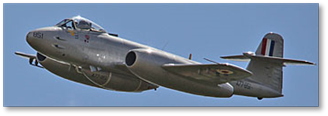
A First
The first female jet pilot in the RAF was Flight Lieutenant Jo Salter in 1994, flying a Panavia Tornado. Now it is a common sight for both men and women to take to the skies for Britain.
The first female jet pilot in the RAF was Flight Lieutenant Jo Salter in 1994, flying a Panavia Tornado. Now it is a common sight for both men and women to take to the skies for Britain.
If Life Seems Jolly Rotten, There’s Something You’ve Forgotten
It was a common tradition for RAF pilots on missions in the first Gulf War to start singing “Always Look on the Bright Side of Life” from Monty Python’s Life of Brian.
anglotopia.net
It was a common tradition for RAF pilots on missions in the first Gulf War to start singing “Always Look on the Bright Side of Life” from Monty Python’s Life of Brian.
anglotopia.net
From: Steve Loxham
Sent: 3/16/2015, 4:17 am, EDT
Subject: Guest Book Entry
Hi, I'm trying to find anyone who may have served with or has pictures of my dad, Brian Loxham (Air Movements). He was a Flt Sgt when he died in Wildenrath around 1980.
Thanks,
Steve Loxham
Click on the NZ flag next to Steve's name to send an e-mail
Sent: 3/16/2015, 4:17 am, EDT
Subject: Guest Book Entry
Hi, I'm trying to find anyone who may have served with or has pictures of my dad, Brian Loxham (Air Movements). He was a Flt Sgt when he died in Wildenrath around 1980.
Thanks,
Steve Loxham
Click on the NZ flag next to Steve's name to send an e-mail
From: Chas Clark, Sprucedale, ON
Sent: 3/16/2015, 9:10 pm, EDT
Subject: Guest Book Entry
Anyone know the whereabouts of John Beadman who was with me at RAF Abingdon on UKMAMS between 1966 and 1969. Be grateful for any information.
Regards,
Chas
ex B Team Leader
Sent: 3/16/2015, 9:10 pm, EDT
Subject: Guest Book Entry
Anyone know the whereabouts of John Beadman who was with me at RAF Abingdon on UKMAMS between 1966 and 1969. Be grateful for any information.
Regards,
Chas
ex B Team Leader
MoD Showcases UK's Upgraded Helicopter Fleet
From: David Powell, Princes Risborough
Sent: Monday, March 16, 2015 11:21 AM
Subject: Freebies
Sent: Monday, March 16, 2015 11:21 AM
Subject: Freebies
Another sort of freebie occurred when on Gulf MAMF in 1971 and we had to deliver a telephone exchange from Sharjah to Hong Kong (Kai Tak) which included a few days holding at Kai Tak waiting for the ride back to the Gulf.
Our tasking Sqn Ldr at the Headquarters at Juffair had a brother who was then commanding the Gurkha regiment up on the Bamboo Curtain. He arranged for us to spend a memorable day right up on the border, including a Land Rover ride along the Bamboo Curtain. At one stage 'our road' actually went under a Chinese overhang above us. At the time this really was a freebie experience that money could not buy.
David Powell
F Team UKMAMS 1967-69 & Gulf MAMF 1971
Our tasking Sqn Ldr at the Headquarters at Juffair had a brother who was then commanding the Gurkha regiment up on the Bamboo Curtain. He arranged for us to spend a memorable day right up on the border, including a Land Rover ride along the Bamboo Curtain. At one stage 'our road' actually went under a Chinese overhang above us. At the time this really was a freebie experience that money could not buy.
David Powell
F Team UKMAMS 1967-69 & Gulf MAMF 1971
Hi Tony,
While at Abingdon, I got detached for a spell to the augment the movements team at JFK New York (it later moved to Dulles, Washington) when the North American trooping was switched from the Queen Elizabeth to twice weekly VC10 flights from Brize.
One of the 'freebies' I discovered was an excellent outfit, the United Service Organisation (USO) club just off Times Square, established to give succour to military personnel. This was then being run by an excellent lass from Birmingham (Birmingham Warwicks not Birmingham Alabama). Through Barbara I was able to obtain free tickets to films, shows, etc. Of these, the best by far, was a front-stall seat for a Glen Campbell concert at the Madison Square Gardens.
While at Abingdon, I got detached for a spell to the augment the movements team at JFK New York (it later moved to Dulles, Washington) when the North American trooping was switched from the Queen Elizabeth to twice weekly VC10 flights from Brize.
One of the 'freebies' I discovered was an excellent outfit, the United Service Organisation (USO) club just off Times Square, established to give succour to military personnel. This was then being run by an excellent lass from Birmingham (Birmingham Warwicks not Birmingham Alabama). Through Barbara I was able to obtain free tickets to films, shows, etc. Of these, the best by far, was a front-stall seat for a Glen Campbell concert at the Madison Square Gardens.

From: Richard Lloyd, Dalgety Bay, Fife
Sent: Monday, March 16, 2015 3:47 PM
Subject: Freebies
Dear Tony,
Just a word of appreciation for the work you do every month to keep us informed, amused and in touch. It's simply super!
My best freebie happened not long ago. 3 years ago I was on assignment in Cape Town, work being scheduled for Monday to Friday as usual. Having been there a couple of times before, and loving it, I decided to take my wife and I organised with my client to arrive the Thursday before, and to leave a week on Monday following the end of the assignment.
So - 4 days of leisure before the course started, and another 9 afterwards. I organised with my sponsor to get the company rate in the very nice hotel in the Victoria and Alfred centre, on the understanding I would pay any extras incurred by my wife, and the costs for the extra 12 days' hotel booking.
Sent: Monday, March 16, 2015 3:47 PM
Subject: Freebies
Dear Tony,
Just a word of appreciation for the work you do every month to keep us informed, amused and in touch. It's simply super!
My best freebie happened not long ago. 3 years ago I was on assignment in Cape Town, work being scheduled for Monday to Friday as usual. Having been there a couple of times before, and loving it, I decided to take my wife and I organised with my client to arrive the Thursday before, and to leave a week on Monday following the end of the assignment.
So - 4 days of leisure before the course started, and another 9 afterwards. I organised with my sponsor to get the company rate in the very nice hotel in the Victoria and Alfred centre, on the understanding I would pay any extras incurred by my wife, and the costs for the extra 12 days' hotel booking.
We had a fine time; ate and drank like royalty, with a very favourable exchange rate. We visited the Cape, the wineries, museums, the gardens, Table Mountain, the beaches and the wildlife. In short we did Cape Town in style.
On checking out, I was unable to get the hotel to understand the concept of me being responsible for some of the bill. All they wanted was my signature. By now, my sponsor had returned to Luanda in Angola, where he was based and was incommunicado.
Back in UK, I emailed him and despite my protestations, he said not to worry about it! So I got paid for my work and my leave. Excellent and unrepeated freebie!
Best
Richard
On checking out, I was unable to get the hotel to understand the concept of me being responsible for some of the bill. All they wanted was my signature. By now, my sponsor had returned to Luanda in Angola, where he was based and was incommunicado.
Back in UK, I emailed him and despite my protestations, he said not to worry about it! So I got paid for my work and my leave. Excellent and unrepeated freebie!
Best
Richard
The world's loneliest elephant arrives in Niue
Niue does not get many human visitors, but now the tiny Pacific Island, home to just 1,500 people, has welcomed an even more unusual guest - Anjalee, probably the world’s loneliest elephant. But the eight-year-old Asian elephant, who arrived in the world’s smallest nation on Friday, will not be lonely for long. Her bizarre detour to Polynesia will provide a three-month quarantine period before she heads to Auckland zoo.
Around 100 curious locals and tourists were at Hannan international airport, which usually only receives one flight a week, to see her arrive on board the Royal New Zealand Air Force Hercules that collected her from Sri Lanka.
Around 100 curious locals and tourists were at Hannan international airport, which usually only receives one flight a week, to see her arrive on board the Royal New Zealand Air Force Hercules that collected her from Sri Lanka.
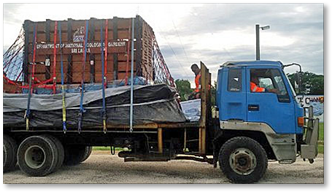
However, they were able to catch only a glimpse of the roving pachyderm as the crate in which she was travelling was delicately transferred from plane to a lorry and transported to her new home in the village of Avatele
Anjalee, who comes from an elephant sanctuary in Sri Lanka, will eventually provide company for Auckland zoo's other elephant, Burma, who has lived alone since the death of her mate Kashin in 2009. A team of vets and zookeepers from Auckland and Sri Lanka will stay with Anjalee during her stay.
TheWeek.co.uk
Anjalee, who comes from an elephant sanctuary in Sri Lanka, will eventually provide company for Auckland zoo's other elephant, Burma, who has lived alone since the death of her mate Kashin in 2009. A team of vets and zookeepers from Auckland and Sri Lanka will stay with Anjalee during her stay.
TheWeek.co.uk
From: Charles Collier, Ewhurst, Surrey
Sent: Monday, March 16, 2015 5:51 PM
Subject: Imprest Collection Tromso 1973
Sent: Monday, March 16, 2015 5:51 PM
Subject: Imprest Collection Tromso 1973
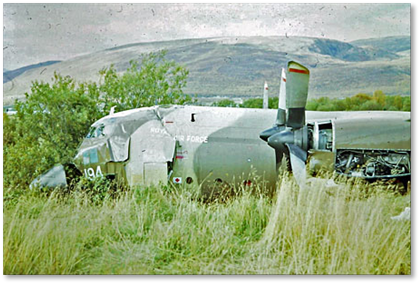
RAF Movers from back in the day will all remember the chaotic circumstances at Tromso surrounding the crashing of the first exercise aircraft to land. The aircraft came to a rest with its fuselage in the storm drain running parallel to the main runway. The port wing was on the runway enabling the crew to exit rapidly.
After the initial excitement had died down I went to see the detachment commander for permission to climb aboard the crashed aircraft to see what damage had been sustained. All aircraft ops had been delayed so there was time to do this.
As I was about to enter I met the accountant officer who arrived at the aircraft looking very worried. He had heard what I was about to do and asked if I could help.
After the initial excitement had died down I went to see the detachment commander for permission to climb aboard the crashed aircraft to see what damage had been sustained. All aircraft ops had been delayed so there was time to do this.
As I was about to enter I met the accountant officer who arrived at the aircraft looking very worried. He had heard what I was about to do and asked if I could help.
It turned out that he was responsible for the detachment imprest which he last saw in a large leather bag in the cab of the 10 ton truck, still tied down in the aircraft. I said that I would be only too pleased to help.
So, I collected a gasmask as I was unsure what had been spilt when it crashed, possibly leaving toxic fumes inside. I climbed up into the lorry cab and found the money bag which contained hard cash sufficient for the detachment expenditures. I hate to think what the sum amounted to as it was very heavy!
There I was with thousands of pounds of public money in an aircraft with nowhere to go! So I exited the aircraft, found the PO accountant and handed over the bag for which he appeared to be very grateful.
All the best to a happy bunch of Movers
Charles
So, I collected a gasmask as I was unsure what had been spilt when it crashed, possibly leaving toxic fumes inside. I climbed up into the lorry cab and found the money bag which contained hard cash sufficient for the detachment expenditures. I hate to think what the sum amounted to as it was very heavy!
There I was with thousands of pounds of public money in an aircraft with nowhere to go! So I exited the aircraft, found the PO accountant and handed over the bag for which he appeared to be very grateful.
All the best to a happy bunch of Movers
Charles
My MATU Team, together with the RAAF airfield fire fighting boys, were located on the far side of Baradine airstrip, well away from the main camp but fortuitously close to the public entrance gate to the strip. We were, however, on the far end of the hot-box meal service delivery route. Things came to a head on the morning of Day Three, when ‘breakfast’ for our team of six and four ‘firies’ consisted of a (cold) hot-box containing five (5) boiled eggs and about a dozen pieces of soggy toast, without any butter, marg or jam. Even augmented from the spare compo rat packs we always carried, this was clearly just not satisfactory, but remonstrations with the main camp catering (sic) staff achieved nothing, and I don’t remember lunch ever arriving that day.
Late that morning, however, Joe asked if he could borrow the 4x4 Toyota for a quick trip into town. I raised an eyebrow, but Sergeant Lloyd Bradshaw, my Team SNCO, winked at me and nodded to Joe. Joe was away for about an hour, and when he came back all he said was “Sorted Boss”…. and sorted it was. By mid-afternoon the local CWA ladies - the Countrywomen’s Association, the female backbone of all Australian rural society - had arrived at the airstrip back fence where we were camped with trays of scones and homemade cakes, homemade jams and homemade pickles; “Hear you’re a bit short of tucker, boys. Hope this helps for now, and we’ll be with more tomorrow”. Next, as dusk fell and flying ceased, a group of the local farmers and shooters arrived with a couple of small freshly-killed piglets and a home-made barbecue on which to cook them.
Late that morning, however, Joe asked if he could borrow the 4x4 Toyota for a quick trip into town. I raised an eyebrow, but Sergeant Lloyd Bradshaw, my Team SNCO, winked at me and nodded to Joe. Joe was away for about an hour, and when he came back all he said was “Sorted Boss”…. and sorted it was. By mid-afternoon the local CWA ladies - the Countrywomen’s Association, the female backbone of all Australian rural society - had arrived at the airstrip back fence where we were camped with trays of scones and homemade cakes, homemade jams and homemade pickles; “Hear you’re a bit short of tucker, boys. Hope this helps for now, and we’ll be with more tomorrow”. Next, as dusk fell and flying ceased, a group of the local farmers and shooters arrived with a couple of small freshly-killed piglets and a home-made barbecue on which to cook them.
After that we never bothered to even open the Army hot boxes when they (occasionally) arrived, and just grazed on the fresh food which was delivered in abundance over the back fence. Even when a visit from the Richmond Base Commander and the Air Staff Officer from Operational Command resulted in a sudden improvement in both the quantity and quality of the camp food, we continued to ‘live off the land’ and the generosity of the local population. I was even taken out ‘roo and pig shooting one night because Joe had told the locals that “…the new Pommie Boss is a bit of a shooter”. Fortunately I didn’t disgrace either the Team or myself with my first ever spotlighting expedition - but that’s another story.
After a few days, and shortly before we started the redeployment, I quietly asked Joe how and when we should settle up with the locals for all the excellent food we’d consumed. “Sorted Boss. Sorted” was Joe’s only response, so still being fairly new to the Team I shut up, stood back and waited.
The following day the first ‘empty’ Herc arrived from Richmond to commence the redeployment back loading. Empty, that was, except a full 463L pallet of cartons of Victoria Bitter (‘VB’) beer. Mac McLaren, our ace forklift driver quickly fork-lifted the pallet to a point adjacent to the back fence and the civilian access road to the airstrip. A convoy of farm trucks, utes and other assorted vehicles then descended on the fence line, and within minutes the pallet was clear and the nets and straps neatly rolled. Not one net or strap was missing
After a few days, and shortly before we started the redeployment, I quietly asked Joe how and when we should settle up with the locals for all the excellent food we’d consumed. “Sorted Boss. Sorted” was Joe’s only response, so still being fairly new to the Team I shut up, stood back and waited.
The following day the first ‘empty’ Herc arrived from Richmond to commence the redeployment back loading. Empty, that was, except a full 463L pallet of cartons of Victoria Bitter (‘VB’) beer. Mac McLaren, our ace forklift driver quickly fork-lifted the pallet to a point adjacent to the back fence and the civilian access road to the airstrip. A convoy of farm trucks, utes and other assorted vehicles then descended on the fence line, and within minutes the pallet was clear and the nets and straps neatly rolled. Not one net or strap was missing
Nothing more was said and the redeployment continued, culminating in a mammoth ENDEX piss-up for all the Defence personnel and all the locals in the Baradine Returned Servicemen’s Club on the last night. Late in the evening I had had enough Dutch courage to ask Joe and Lloyd what had actually transpired. “Well, you see Boss, it’s like this. The locals are paying anything up to $1 a can in town for VB because of transport costs, but we can buy it in bulk for less than 50 cents a can back at base through the Sergeants’ Mess. We fixed up with the Squadron loadies to get a pallet load of beer from the Mess down to Air Movements and onto the first redeployment bird. When all the sums have been worked out, the profit that the locals will make or the money they’ll save on the cheap VB completely off-sets the cost price of the booze and all the tucker we’ve had dropped off over the fence. Even covers the ammo for your spotlighting. Like I said; sorted, Boss, sorted!”
Len Bowen
FEAF MAMS 1966-68
RAAF MATU 1 1980-81
Len Bowen
FEAF MAMS 1966-68
RAAF MATU 1 1980-81
From: Len Bowen, Chisholm, ACT
Sent: Tuesday, March 17, 2015 8:06 AM
Subject: Freebie - Baradine, NSW “Sorted, Boss”
G’day Tony,
I hope that the Statute of Limitations for beer smuggling in NSW is less than 35 years, so here goes:
Every MAMS or MATU Team needs an ace scrounger. The sort of bloke who would, in a British 1950s b&w B film, be able to take a pound of the Colonel’s butter ration and a gallon of petrol from his staff car and turn it into a full roast dinner in the field for all the Regiment, complete from soup to nuts and all alcoholic accompaniments.
In 1980, when I took over as Team Leader of MATU 1 at RAAF Base Richmond, we had Corporal Joe Jenner. Joe was notionally our trim clerk and documentation guru - and extremely good at it, he was too. He was also the very best scrounger I have ever encountered in my fifty years in Air Force uniform.
April 1980, Baradine, central NSW, Exercise PELICAN’S PROGRESS 80, the annual shake-down joint field exercise for all deployable Richmond-based units and formations. The Army were doing the rationing and cooking, and by Day Two of the exercise we realised that they had cocked up big time - we found out later that they had under-rationed by over fifty personnel.
Sent: Tuesday, March 17, 2015 8:06 AM
Subject: Freebie - Baradine, NSW “Sorted, Boss”
G’day Tony,
I hope that the Statute of Limitations for beer smuggling in NSW is less than 35 years, so here goes:
Every MAMS or MATU Team needs an ace scrounger. The sort of bloke who would, in a British 1950s b&w B film, be able to take a pound of the Colonel’s butter ration and a gallon of petrol from his staff car and turn it into a full roast dinner in the field for all the Regiment, complete from soup to nuts and all alcoholic accompaniments.
In 1980, when I took over as Team Leader of MATU 1 at RAAF Base Richmond, we had Corporal Joe Jenner. Joe was notionally our trim clerk and documentation guru - and extremely good at it, he was too. He was also the very best scrounger I have ever encountered in my fifty years in Air Force uniform.
April 1980, Baradine, central NSW, Exercise PELICAN’S PROGRESS 80, the annual shake-down joint field exercise for all deployable Richmond-based units and formations. The Army were doing the rationing and cooking, and by Day Two of the exercise we realised that they had cocked up big time - we found out later that they had under-rationed by over fifty personnel.
Princess Anne praises No 30 Squadron’s
centenary of tradition at RAF Brize Norton
centenary of tradition at RAF Brize Norton
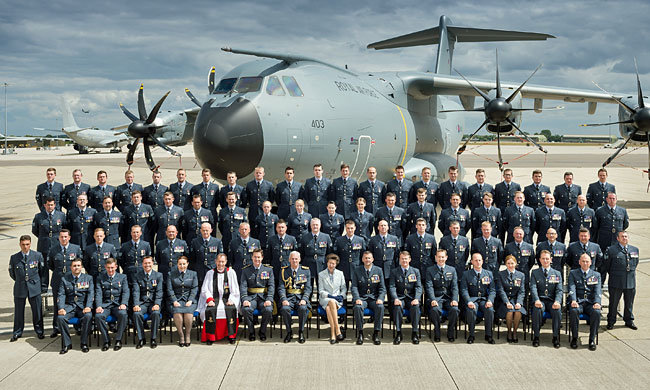
Princess Anne yesterday [Tuesday 24 March] paid tribute to the 100th anniversary of No 30 Squadron during a centenary parade at RAF Brize Norton. Personnel, including pilots, engineers and technicians, saluted the Princess Royal as they marched through the airbase.
Joining her on the podium in front of about 100 seated guests and military personnel was fellow guest of honour Air Vice-Marshal Sean Reynolds, Air Commanding Officer. They returned the salute as the marchers passed.
Seventy-seven personnel, including 11 from No 30 Squadron, paraded to the sound of the National Anthem, The Great Escape theme tune and a surprise brass version of Happy by Pharrell Williams, all performed by the Central Band of the RAF.
Joining her on the podium in front of about 100 seated guests and military personnel was fellow guest of honour Air Vice-Marshal Sean Reynolds, Air Commanding Officer. They returned the salute as the marchers passed.
Seventy-seven personnel, including 11 from No 30 Squadron, paraded to the sound of the National Anthem, The Great Escape theme tune and a surprise brass version of Happy by Pharrell Williams, all performed by the Central Band of the RAF.
The Princess Royal said: “Although 100 years have passed, the tradition remains the same. This is an opportunity to mark those achievements.”
No 30 Squadron, which began in Egypt, in 1915, is lauded for its services in Iraq and Afghanistan. The squadron, which currently includes 30 members [?], was also deployed in Haiti to help with the relief effort after the 2010 earthquake and the Philippines after Typhoon Haiyan in 2013.
Sergeant and engineer at Brize Norton Michael Stockham, who took part in the parade, said: “It’s a good career. The tradition means a lot to me and it is proud day.”
Wing Commander Andrew Garbutt, Officer Commanding No 30 Squadron since 2012, said that the parade had been a highlight of his career.The married father-of-three, who was the parade commander responsible for the march, said: “Leading the squadron out of Afghanistan last year was a highlight.” He added: “But today was a highlight as well, to take a squadron with the history that it has.”
Oxford Mail
No 30 Squadron, which began in Egypt, in 1915, is lauded for its services in Iraq and Afghanistan. The squadron, which currently includes 30 members [?], was also deployed in Haiti to help with the relief effort after the 2010 earthquake and the Philippines after Typhoon Haiyan in 2013.
Sergeant and engineer at Brize Norton Michael Stockham, who took part in the parade, said: “It’s a good career. The tradition means a lot to me and it is proud day.”
Wing Commander Andrew Garbutt, Officer Commanding No 30 Squadron since 2012, said that the parade had been a highlight of his career.The married father-of-three, who was the parade commander responsible for the march, said: “Leading the squadron out of Afghanistan last year was a highlight.” He added: “But today was a highlight as well, to take a squadron with the history that it has.”
Oxford Mail
From: Mick Craner, Auckland
Sent: Monday, March 23, 2015 8:15 PM
Subject: Freebies
G'day Tony,
At present in New Zealand. I have fond memories of the imprest and the goodies contained within.
One of the best was the local allowance that you could receive twice in a very short time; if you landed before midnight you received the allowance for that day, then after midnight the allowance for the next day. Magic!
Regards
Mick Craner
Sent: Monday, March 23, 2015 8:15 PM
Subject: Freebies
G'day Tony,
At present in New Zealand. I have fond memories of the imprest and the goodies contained within.
One of the best was the local allowance that you could receive twice in a very short time; if you landed before midnight you received the allowance for that day, then after midnight the allowance for the next day. Magic!
Regards
Mick Craner
From: Rodney Elliott, Brinkworth, Wilts
Sent: Tuesday, March 24, 2015 3:26 PM
Subject: Memories of Dave Egg
Hi Tony,
Sent: Tuesday, March 24, 2015 3:26 PM
Subject: Memories of Dave Egg
Hi Tony,
(I was able to enhance the photograph and reveal the contents of the certificate - it's a copy of Dave's transfer to the Reserves. Roll your mouse over the photo above to see the detail.)
I attended Dave Eggleton’s memorial service in February and thought it a most fitting send off for such a good man. Recently, when looking through a pile of old photos I came across this one of him which was taken on his retirement from the RAF (I wish I’d found it before). It was taken on 20 May 1988 and features Flt Lt Peter Birch (4624 Sqn R Aux AF), WO Dave Eggleton, and Sqn Ldr Rod Elliott (OC RAFMS). I can’t remember what he was holding in the photo - perhaps Peter can - but I suspect it was a citation recording his many years service. We were re-united again at the memorial as both Peter and I were there and I know Dave was in spirit. I just thought I’d share this with you.
Kind regards and keep up the excellent work, Rod
Kind regards and keep up the excellent work, Rod
From: John Bell, Desborough, Northants
Sent: Tuesday, March 03, 2015 4:32 AM
Subject: Dave Eggleton
Tony,
There is a short article on Dave Egg, with a photo, in the Abingdon St Helen’s Church magazine. It's by his friend and companion, Barbara Earl.
John
Sent: Tuesday, March 03, 2015 4:32 AM
Subject: Dave Eggleton
Tony,
There is a short article on Dave Egg, with a photo, in the Abingdon St Helen’s Church magazine. It's by his friend and companion, Barbara Earl.
John
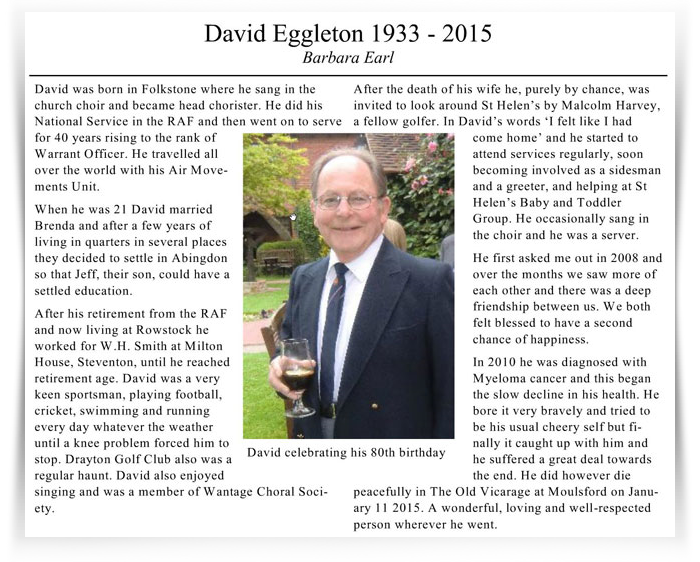
The Great Escape Drove the Nazis Nuts
But Hitler’s thirst for revenge led to the murder of 50 prisoners of war
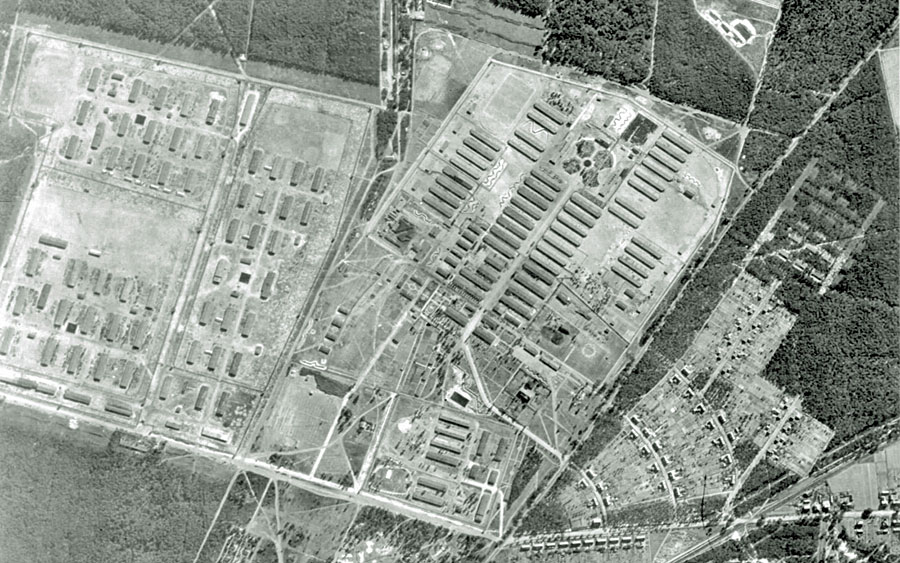
On March 24, 1944, 76 Allied prisoners of war crawled out of a tunnel during a moonless night and headed through the snow-covered woods of Poland. They were fleeing the German prison camp Stalag Luft III. What happened next confounded Nazi Germany’s security forces for weeks, infuriated Hitler and led to the murder of 50 of the escapees by the Gestapo.
It’s known as “The Great Escape,” and it was World War II’s most daring and ingenious effort by Allied POWs to flee their German captors. A best-selling book and a popular Hollywood movie chronicled their flight. But more than 70 years later, what many forget is that despite months of dangerous and backbreaking work, only three men made it all the way to freedom.
Stalag Luft III was about 100 miles southeast of Berlin near the town of Zagan, in what is now present-day Poland. The prison was huge. Divided into five compounds, the 60-acre POW camp eventually held more than 10,000 prisoners. Opened in 1942, it was a high-security camp where the Germans intended to put all their rotten apples in one basket. The Nazis often shipped troublemakers, repeat escapees and malcontents there. And from the beginning, Berlin planned Stalag Luft III to hold Allied airmen. Forest surrounded the camp for miles, isolating it from roads and railroad lines.
It’s known as “The Great Escape,” and it was World War II’s most daring and ingenious effort by Allied POWs to flee their German captors. A best-selling book and a popular Hollywood movie chronicled their flight. But more than 70 years later, what many forget is that despite months of dangerous and backbreaking work, only three men made it all the way to freedom.
Stalag Luft III was about 100 miles southeast of Berlin near the town of Zagan, in what is now present-day Poland. The prison was huge. Divided into five compounds, the 60-acre POW camp eventually held more than 10,000 prisoners. Opened in 1942, it was a high-security camp where the Germans intended to put all their rotten apples in one basket. The Nazis often shipped troublemakers, repeat escapees and malcontents there. And from the beginning, Berlin planned Stalag Luft III to hold Allied airmen. Forest surrounded the camp for miles, isolating it from roads and railroad lines.
The camp’s designers picked the area because the underlying soil would help thwart tunneling, and they elevated the numerous POW barracks off the ground to make it more difficult for prisoners to clandestinely dig their way out. Watch towers -which the POWs nicknamed “goon towers” surrounded Stalag Luft III. So did a “death zone” stretching along the inside perimeter of the camp’s barbed wire fence. Cross the death zone, and guards would shoot you on the spot. Still, many of the prisoners made escape plans. One of them wanted an escape so big, it would damage the German war effort.
His name was Roger Bushell, also known as “Big X.” An RAF pilot with two previous escape attempts already under his belt, he wanted to bust out as many POWs as he could from the camp … and stick it to the Germans. “Everyone here in this room is living on borrowed time,” Bushell told the camp’s escape committee. “By rights we should all be dead! The only reason that God allowed us this extra ration of life is so we can make life hell for the Hun.”
As far as Bushell was concerned, the camp’s anti-escape features were nothing more than a professional challenge. He located like-minded POWs, and coordinated an effort that eventually involved the work of 600 men.
The group’s plan called for three tunnels named Tom, Dick and Harry. Tom would run underneath one of the prisoners’ barracks. They planned to dig Dick underneath the prison’s shower house. And they concealed Harry’s entrance with a stove. Prisoners dug the tunnels 30 feet below the surface to avoid sound detectors. They cut through building supports to hide their work and concealed the entrances with devices such as a removable concrete slab.
As far as Bushell was concerned, the camp’s anti-escape features were nothing more than a professional challenge. He located like-minded POWs, and coordinated an effort that eventually involved the work of 600 men.
The group’s plan called for three tunnels named Tom, Dick and Harry. Tom would run underneath one of the prisoners’ barracks. They planned to dig Dick underneath the prison’s shower house. And they concealed Harry’s entrance with a stove. Prisoners dug the tunnels 30 feet below the surface to avoid sound detectors. They cut through building supports to hide their work and concealed the entrances with devices such as a removable concrete slab.
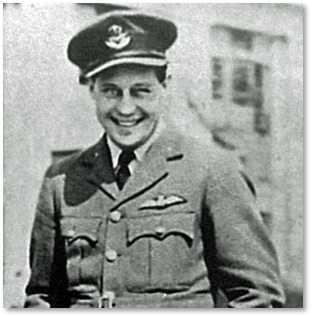
In the meantime, Bushell and his compatriots devised clever plans to assist the construction, ranging from secret surveying techniques, to a way of disposing the excavated soil without raising the suspicion of “the goons.” Sometimes his behavior seemed odd to prisoners who didn’t know about the escape plans. He had a brusque statement for them. “If you see me walking around with a tree trunk sticking out of my arse, don’t ask any questions, because it’ll be for a damned good reason,” Bushell said.
By the time they made their move, the German had discovered one tunnel, and the prisoners had halted work on another. Harry was the only escape route left. But the prisoners miscalculated the tunnel’s distance as it emerged just short of a dense tree line. Only 76 POWs managed to make it through during the escape night. What happened next is far different than what Hollywood portrayed.
As exciting and popular as the film is, the 1963 movie The Great Escape is mostly a work of fiction. The cinematic imperative to showcase big-name American stars drove the plot, not historical facts. For one, American POWs had little to do with the construction of the tunnels, or formulating the escape plans. The Germans moved the Americans to a new compound within the camp several months before the escape. Some of the most daring escape methods in the film are also complete fabrications.
The movie depicts characters portrayed by James Garner and Donald Pleasence attempting to fly to freedom in a stolen German plane but no escapee ever used an aircraft. Steve McQueen’s dramatic motorcycle ride to the Swiss border with German soldiers in hot pursuits is a legend in film history. It, too, is total fiction. In reality, most of the prisoners traveled by foot or by railway.
By the time they made their move, the German had discovered one tunnel, and the prisoners had halted work on another. Harry was the only escape route left. But the prisoners miscalculated the tunnel’s distance as it emerged just short of a dense tree line. Only 76 POWs managed to make it through during the escape night. What happened next is far different than what Hollywood portrayed.
As exciting and popular as the film is, the 1963 movie The Great Escape is mostly a work of fiction. The cinematic imperative to showcase big-name American stars drove the plot, not historical facts. For one, American POWs had little to do with the construction of the tunnels, or formulating the escape plans. The Germans moved the Americans to a new compound within the camp several months before the escape. Some of the most daring escape methods in the film are also complete fabrications.
The movie depicts characters portrayed by James Garner and Donald Pleasence attempting to fly to freedom in a stolen German plane but no escapee ever used an aircraft. Steve McQueen’s dramatic motorcycle ride to the Swiss border with German soldiers in hot pursuits is a legend in film history. It, too, is total fiction. In reality, most of the prisoners traveled by foot or by railway.
Yet, the film had many qualities that did ring true. The sets constructed at a Bavarian studio were meticulously prepared replicas of the actual prison. The film’s art director and set designers spent hours researching Stalag Luft III, and hired former POW and Royal Canadian Air Force pilot Wally Floody as a technical adviser. Floody was a POW dubbed “The Tunnel King,” because of his work organizing and leading tunnel construction at the camp. He wasn’t only impressed with the results he was personally affected by what he saw. When asked about what he thought of the sets, Floody replied that he knew they were realistic because they prompted nightmares about his wartime experiences.
Back in 1944, the escape of 76 POWs caused a major headache for the German police and security services. The Nazis mounted a massive search. Reserve soldiers, police and the Gestapo were part of the operation to round up the escapees. Some estimates suggest the Germans committed as many as 70,000 men to the search effort.
The POWs fanned out across Germany. Most of them split up into organized escape parties led by at least one member who spoke fluent German. All had forged papers and travel passes that allowed them to move through checkpoints. But the intensity and size of the manhunt worked against them. One by one, the Nazis rounded up the escapees, and within two weeks nearly all of them were back in captivity.
Back in 1944, the escape of 76 POWs caused a major headache for the German police and security services. The Nazis mounted a massive search. Reserve soldiers, police and the Gestapo were part of the operation to round up the escapees. Some estimates suggest the Germans committed as many as 70,000 men to the search effort.
The POWs fanned out across Germany. Most of them split up into organized escape parties led by at least one member who spoke fluent German. All had forged papers and travel passes that allowed them to move through checkpoints. But the intensity and size of the manhunt worked against them. One by one, the Nazis rounded up the escapees, and within two weeks nearly all of them were back in captivity.
Only three of the POWs successfully escaped. Norwegians Per Bergsland and Jens Muller stowed away on a freighter to neutral Sweden. Bob van der Stok, a Dutchman, traveled by train and foot to British-held Gibraltar.
The Geneva Convention limited punishment for escape to a brief disciplinary prison sentence, usually no more than 10 days. Most of the captured POWs thought their captors would ship them back to Stalag Luft III. But the escape was a massive embarrassment to the Reich … and Adolf Hitler wanted revenge.
The Fuhrer called for the execution of all the POWs, an order so drastic that some in the Nazi inner circle such as Hermann Göring tried to persuade Hitler to change his mind out of fear there would be reprisals against German POWs in Allied hands.
In the end, Hitler ordered Gestapo chief Heinrich Himmler to deal with the POWs. Hitler then insisted on executing at least half of the prisoners.
Himmler had fewer scruples. He decided 50 should die so one by one, the Gestapo interrogated and executed them. The movie incorrectly portrays their deaths as a single massacre. The dead also included Bushell or “Big X.” The Gestapo murdered him and his escape partner, Bernard Scheidhauer, three days after their re-capture. The Nazis told the remaining POWs at Stalag Luft III that guards shot the prisoners “during escape.”
After the war, a 15-person Royal Air Force investigative team relentlessly tracked down the Gestapo perpetrators, captured them and turned them over to authorities for trial on charges of war crimes. The Allies hanged 21 of them and others received stiff sentences.
Paul Huard, medium.com
The Geneva Convention limited punishment for escape to a brief disciplinary prison sentence, usually no more than 10 days. Most of the captured POWs thought their captors would ship them back to Stalag Luft III. But the escape was a massive embarrassment to the Reich … and Adolf Hitler wanted revenge.
The Fuhrer called for the execution of all the POWs, an order so drastic that some in the Nazi inner circle such as Hermann Göring tried to persuade Hitler to change his mind out of fear there would be reprisals against German POWs in Allied hands.
In the end, Hitler ordered Gestapo chief Heinrich Himmler to deal with the POWs. Hitler then insisted on executing at least half of the prisoners.
Himmler had fewer scruples. He decided 50 should die so one by one, the Gestapo interrogated and executed them. The movie incorrectly portrays their deaths as a single massacre. The dead also included Bushell or “Big X.” The Gestapo murdered him and his escape partner, Bernard Scheidhauer, three days after their re-capture. The Nazis told the remaining POWs at Stalag Luft III that guards shot the prisoners “during escape.”
After the war, a 15-person Royal Air Force investigative team relentlessly tracked down the Gestapo perpetrators, captured them and turned them over to authorities for trial on charges of war crimes. The Allies hanged 21 of them and others received stiff sentences.
Paul Huard, medium.com
